Gathering of the Crimson clan
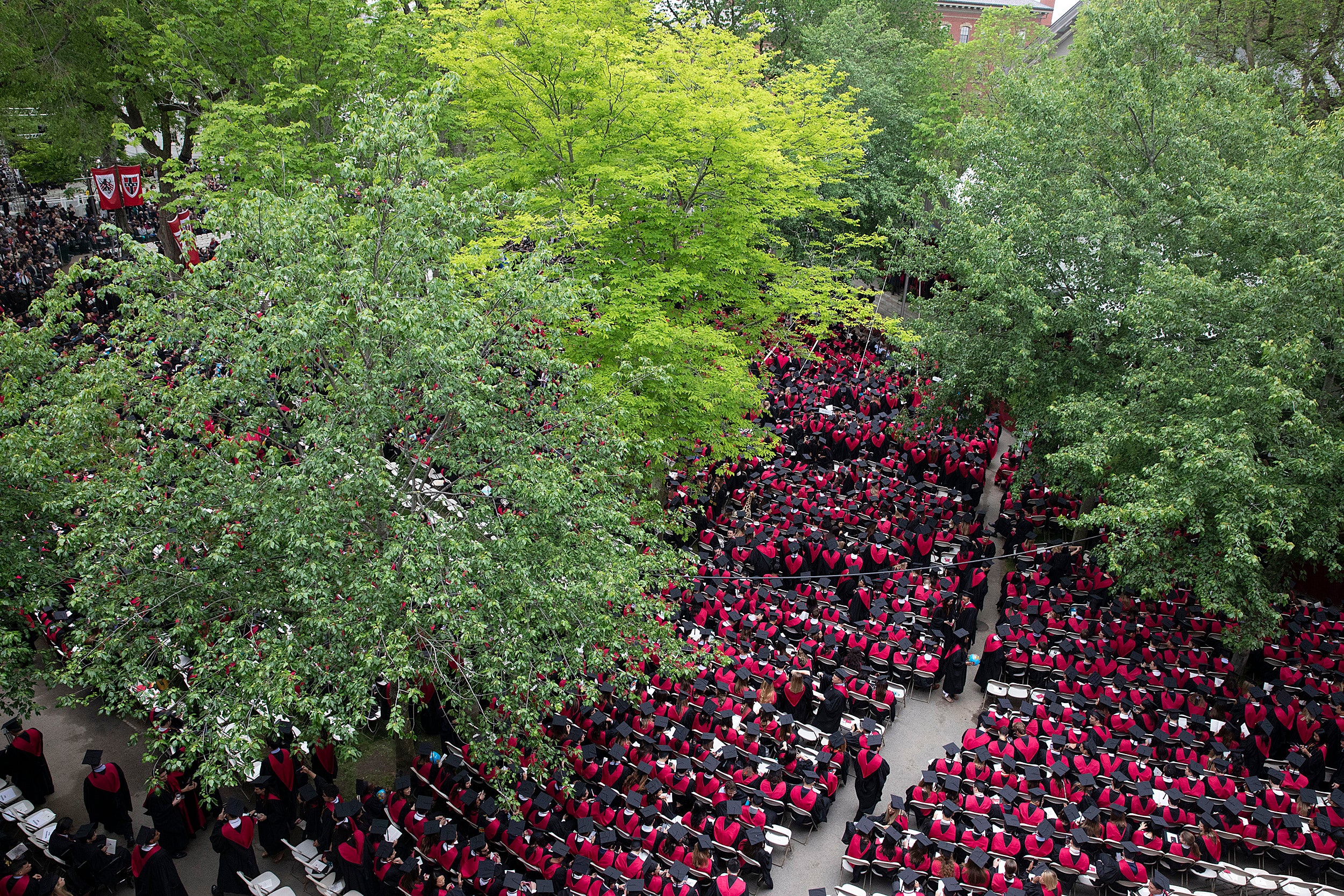
Kris Snibbe/Harvard Staff Photographer
Snapshots from Harvard’s celebratory 368th Commencement, from dawn to dusk
Commencement at Harvard is a day of formal ceremonies and poignant moments. Below are snippets of the latter, along with some context from celebrations past. (This file was topped with fresh vignettes throughout the day.)
Harvard’s tough, but the Marine Corps is tougher
Eliza Edwards, a newly minted A.L.M. graduate of Harvard Extension School, stood with her parents, Joel and Dana Edwards, amid the rapidly emptying chairs at Tercentenary Theatre after Harvard Alumni Association President Margaret Wang’s gavel closed Commencement ceremonies.
Joel and Dana Edwards said they’d been to other commencements before but were impressed by the way Harvard’s celebration included students from all Schools, not just undergraduates from the College. They also said that Harvard pulled off the difficult mix of honoring longstanding traditions while recognizing the personal meaning the daylong celebration holds for graduates and their families.
“I think it’s a unique experience that tries to blend the history together with today,” Joel said. “It’s a great experience.”
The ceremony was a first for Eliza, who missed her undergraduate commencement at Willamette University in Oregon after joining the Marine Corps just shy of the credits to graduate. She spent five years in the Corps, eventually earning her final credits at Willamette in 2014 and becoming a sergeant in signals intelligence.
After finishing at Willamette, she started taking courses at the Extension School, viewing lectures online while deployed in Uganda and Niger — or in Uganda, anyway. Internet service in Niger was spotty enough that she had to turn to her mother for help at times.
“My mom had to watch lectures when my internet went out for a while. She had to send me notes,” said Eliza, who is heading to law school in the fall. “It was fun.”
“It was a group effort here,” Dana added.
When asked which was harder, Harvard or the Marine Corps, Eliza said they’re pretty different, but the Defense Language Institute tips it toward the Marine Corps.
“The hardest school I ever went to was when I had to learn Arabic at DLI,” Eliza said.
— Alvin Powell
Community caliber
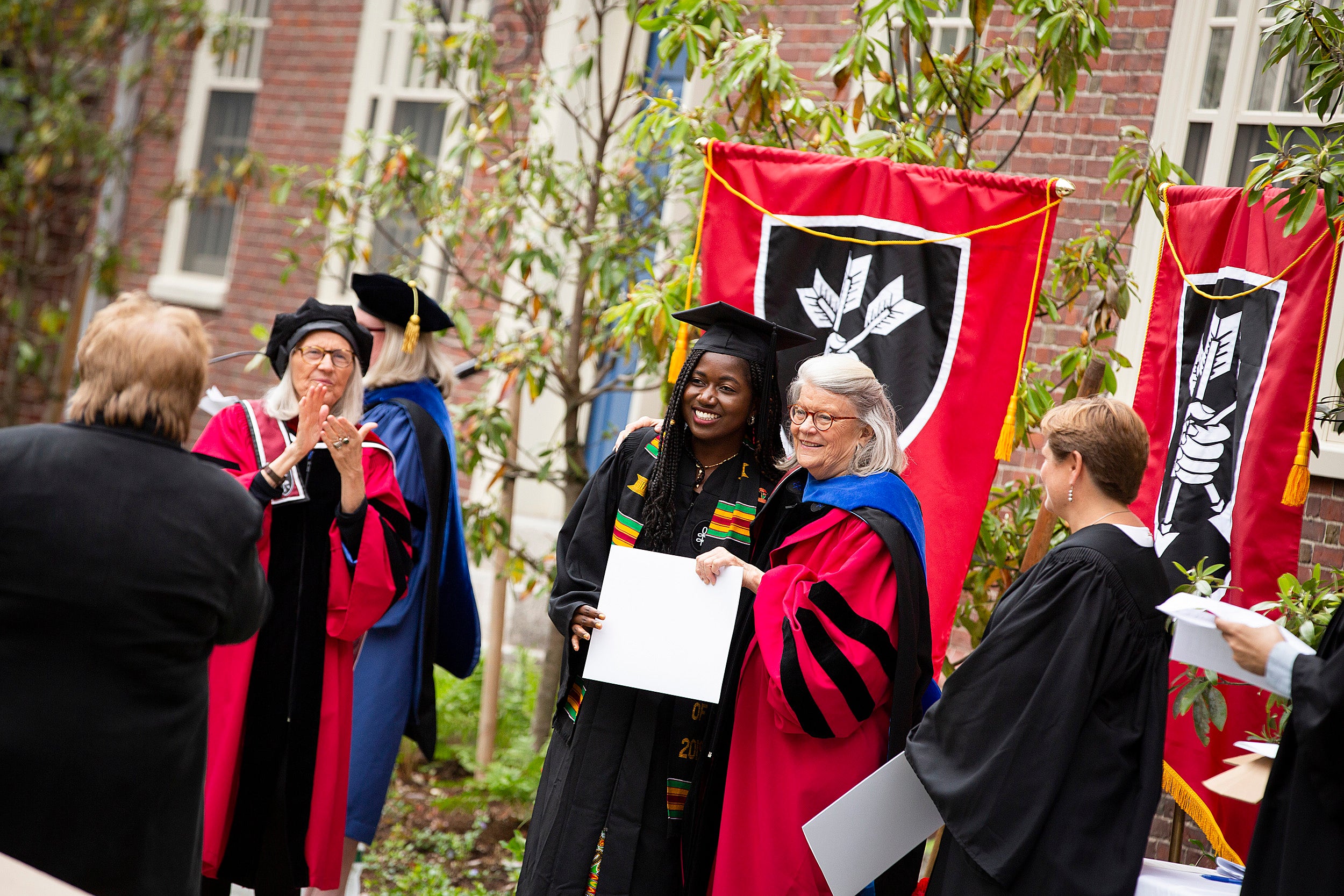
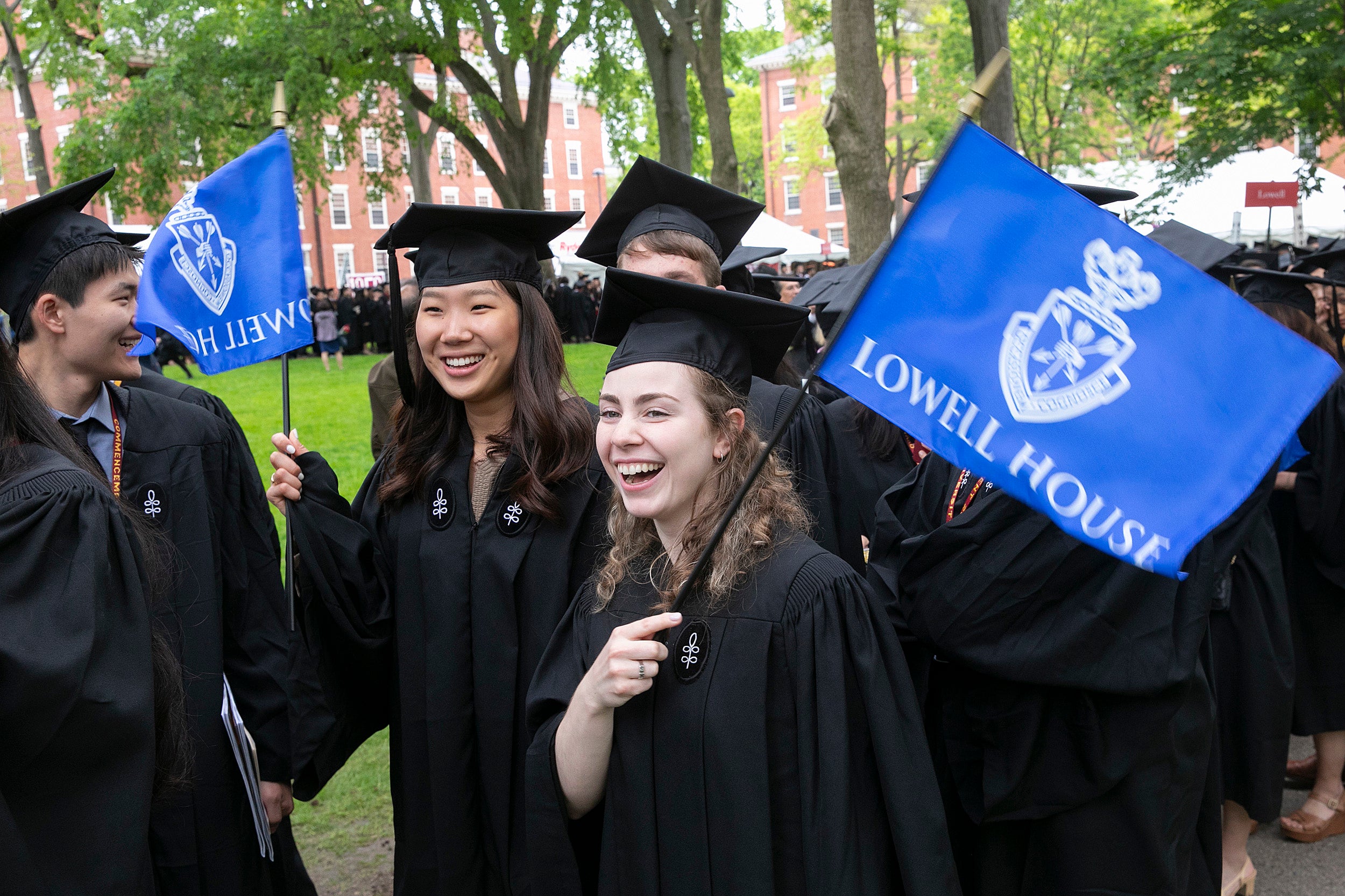
The Lowell House community celebrates its graduates.
Stephanie Mitchell and Jon Chase/Harvard Staff Photographers
When Peter Bearse leaves Lowell House for a job at Barclays in New York City, he will miss the people he found here.
“It’s a special thing to celebrate,” said the statistics concentrator. “It’s the last day before we get out of here, so I’m just trying to spend time with the people who matter to me. I don’t know if there’s another place in the world that brings people of this caliber together. I’ve tried not to take it for granted these past four years.”
Waiting in the Lowell House courtyard, Bearse watched as some of those friends received their diplomas and cheered them on as they did. He reflected that it’s the community created at the House that he will miss most of all.
“I think people are really passionate and caring,” Bearse said. “There are lot of environments where it’s sort of toxic and the competitiveness gets the best of people. I think here people are really able to balance caring deeply about what they do and still being very friendly.”
—Juan Siliezar
Traffic on the footbridge
The John W. Weeks Bridge over the Charles River was bustling with graduates and their families taking photos and reveling in this day of accomplishment. Among them was Andover native Kailash S. Sundaram and his family, including his grandfather, who flew in from India last night.
“It’s a very happy occasion,” said the grandfather, Sundaram Veerappa. “It’s lifetime experience.”
For Sundaram, it means everything that his family is here with him, because he credits them with getting him to this moment. “I think that we’re here on the backs of our parents’ hard work and the dreams that they had for us,” said Sundaram, a Winthrop House resident and social studies concentrator. “It feels cool for them to be here with us and take it all in. Now it’s trying to put the Harvard degree to use … and try to make this world a better place.”
To do that, he is heading to Detroit or St. Louis to work on a program called Venture for America as part of a fellowship for recent graduates who want training in entrepreneurship.
Ryan Antonellis and his family from Burke, Va., walked a little farther down. Though he sported the cap and gown and posed for photos with his father, mother, and brother, Antonellis said, “It hasn’t really hit me yet that I’ve graduated. Talking to a bunch of my classmates, it’s kind of the same thing.”
Still, Antonellis couldn’t deny the energy and the feeling of pride — and neither could his mother, Cherie.
“We’re very proud,” she said with a smile. “He set a goal; he accomplished it. He’s all grown up now.”
— Juan Siliezar
‘Three, two, one!’
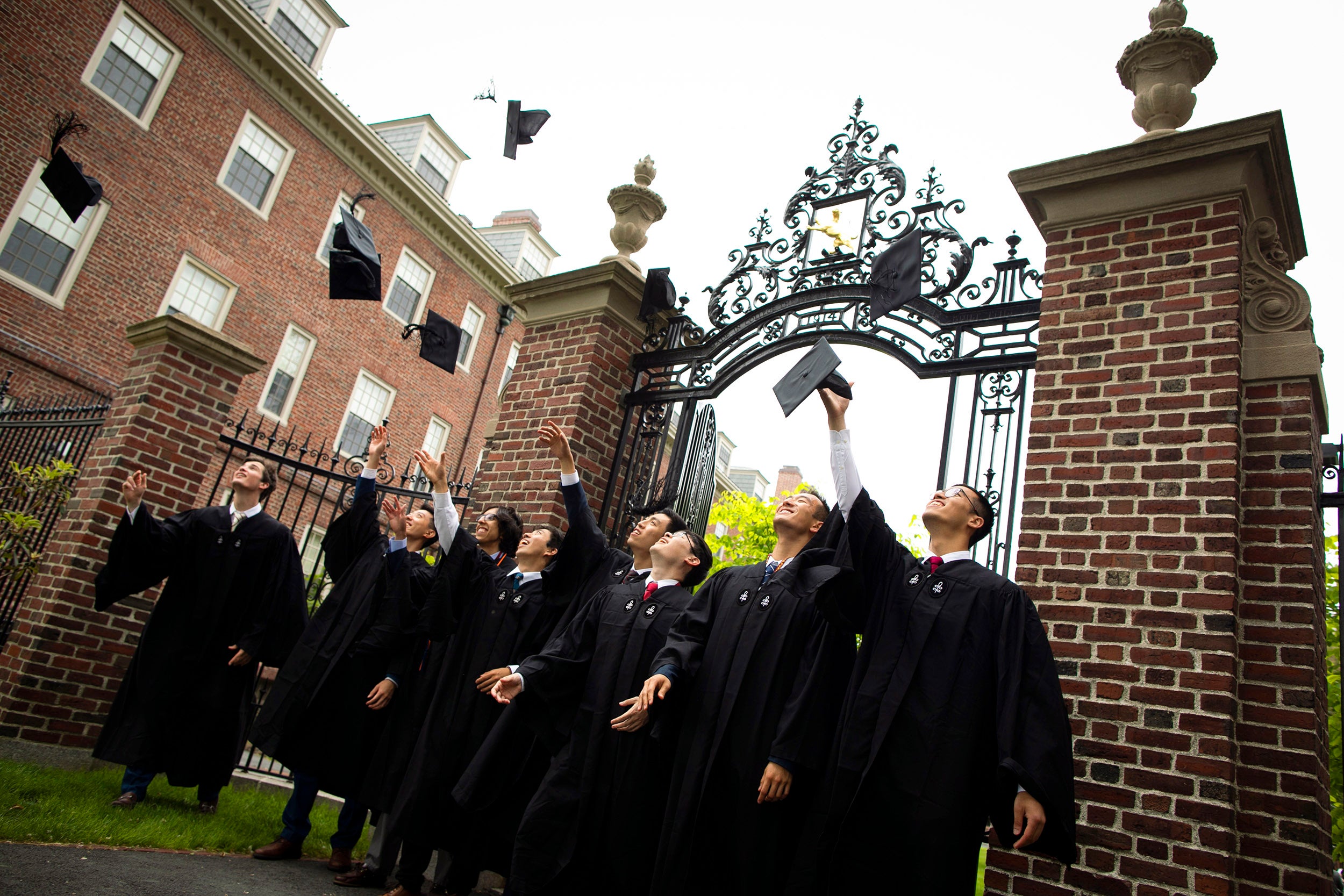
Albert Chien (from right), Michael Liu, Bovey Rao, Michael Shao, Andrew Jing, Benjamin Gaytan Rios, Phillip Yu, and Jack Lane toss their caps for the perfect photo op.
Stephanie Mitchell/Harvard Staff Photographer
Outside the Winthrop House gate, a group of classmates gathered for a cherished Commencement Day tradition: tossing their caps.
While tossing a hat is easy, snapping the perfect photo of it is not, which is something the friends — Albert Chien, Michael Liu, Bovey Rao, Michael Shao, Andrew Jing, Benjamin Gaytan Rios, Phillip Yu, and Jack Lane — learned the hard way. “Three, two, one!” almost all of them counted, tossing and picking up the caps before repeating the motion again and again.
Finally, after the fifth or sixth take, they got it right.
— Juan Siliezar
Playing their song
At about a quarter past 2 p.m., the bells of Lowell House pealed a tune familiar to three Winthrop House residents: “Old Town Road,” the viral 2019 hit by rapper Lil Nas X.
Deepika Kurup smiled, almost in disbelief, with her roommates Yong Dich and Laura Doherty. “It’s kind of the song of me and my roommates,” said Kurup, who concentrated in neuroscience.
“We went on our trip to Europe for senior week and we just kept playing ‘Old Time Road’ the whole time,” added Doherty, who concentrated in sociology.
“[The song] is such a meme at this point,” said Dich, who concentrated in computer science.
But because of the trip, it will always bind them.
— Juan Siliezar
It’s family — so it’s complicated
As Commencement Day’s Afternoon Program — officially, the annual meeting of the Harvard Alumni Association — prepared to get underway, Sonja Diaz-Granados and Ehrentrud Noah sat together watching the crowds pass by.
Asked who they were at Commencement to see, they said something approximating “son-brother-daughter-granddaughter,” and then laughed at the questioner’s bewildered look.
Slowing it down, Diaz-Granados is Noah’s daughter and both were there for the Harvard College graduation of Diaz-Granados’ daughter (and Noah’s granddaughter) Katja. They were also there, however, for the 25th class reunion for Diaz-Granados’ husband (Katja’s father), Rafael. Adding to the picture is the fact that Katja’s sister (also Diaz-Granados’ daughter and Noah’s granddaughter) Sriyani graduated last year, and her uncle, Lars Noah (Diaz-Granados’ brother and Noah’s son), graduated from the College and the Law School, but skipped both Commencements.
That’s a whole lot of Harvard graduations, which is why Noah was particularly happy to finally be on campus during one, because despite the extensive family connections, it was the first time she’d made it to Commencement.
“Because they didn’t go,” Noah said, “this is the first one I’ve come to. I’m very proud.”
Harvard, it turns out, also played a role — albeit a bit part — in Katja and Sriyani’s arrival on planet Earth because Diaz-Granados and her husband were high school classmates in Coral Gables, Fla., and had a competition going to see who could get into Harvard.
He succeeded and she didn’t, but they wound up becoming sweethearts. In Diaz-Granados’ high school yearbook, Rafael left his folded Harvard acceptance letter, on which he’d written: “This used to be the most important thing for me. Now you are.”
“We’ve been together ever since,” Diaz-Granados said.
— Alvin Powell
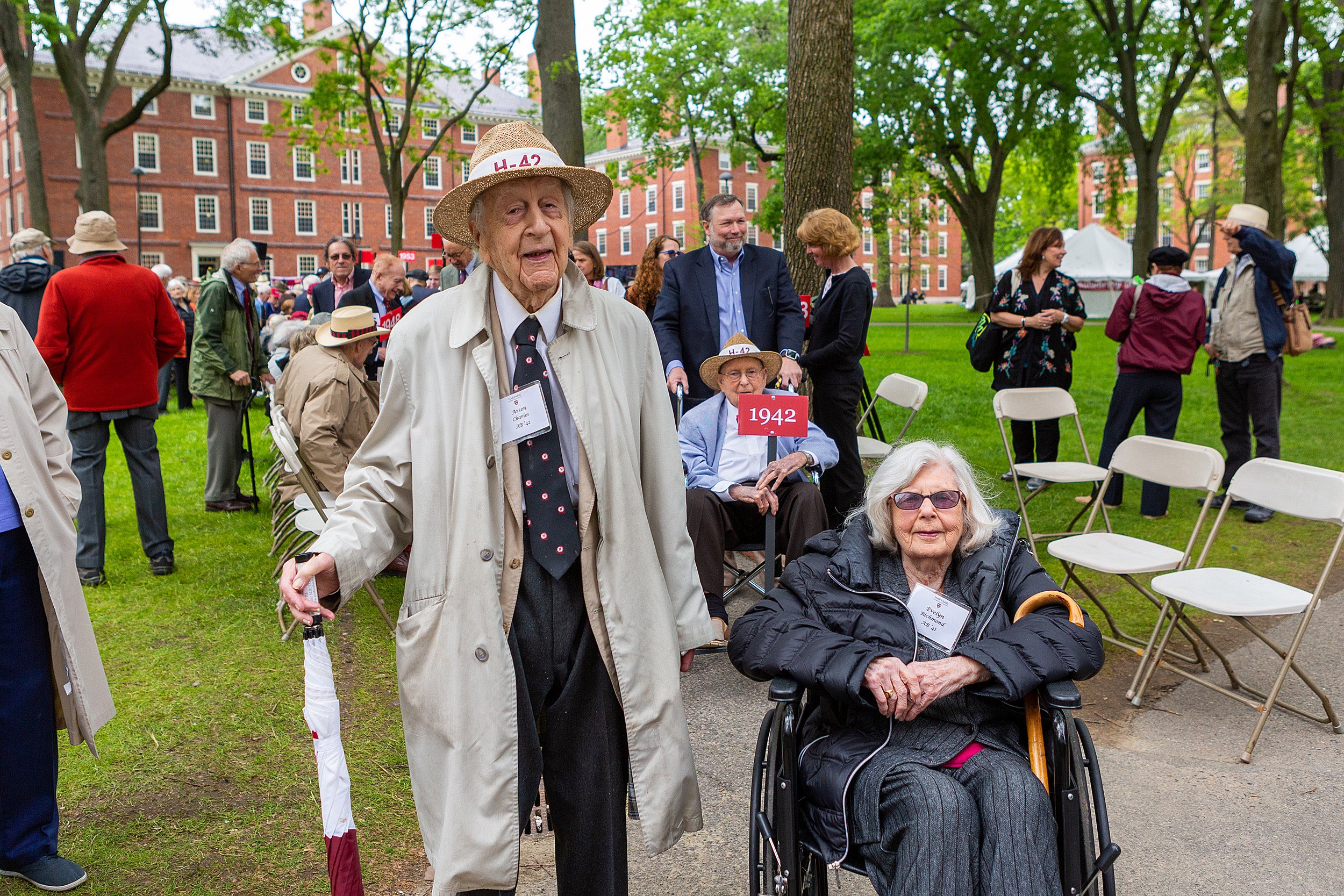
Evelyn Richmond ‘41 (right), age 97, and Arsen Charles ‘42, age 99, are recognized by the Harvard Alumni Association as the two eldest alumni in attendance. They led the procession to the Afternoon Program into Tercentenary Theatre.
Photo by Michael D. Spencer
Booker keeps on running
Houston state police officer Charlie Booker Jr. stood in front of the John Harvard Statue to reflect on his son Charlie Booker III’s accomplishments, both as a recent Harvard graduate and as a top running back for the football team.
“He’s smart and intelligent, like his mom,” said Booker, pride in his voice. “He’s really dedicated and very focused, both on his studies and sports. It’s almost scary.”
The younger Booker, who concentrated in economics, was a two-time team MVP and senior captain for the Harvard Crimson. After graduation, he will return to Houston for a big family celebration, and next Monday, he’ll head off to Rice University to begin an M.B.A. program.
“I asked him, ‘When are you going to slow down?’” said his father with a chuckle. “But all his accomplishments will surely open doors for him. I’m in awe of him and all the graduates here.”
— Liz Mineo
Felicitaciones
Standing in Harvard Yard, the family of Luis Campos held “Congratulations” signs written in Spanish to show their pride in the recent graduate.
Campos’ mother, Lilia Manzo, couldn’t hold back tears as she held a sign reading “Mamá Orgullosa” (“Proud Mom”). The fifth of nine children, her son graduated from the Graduate School of Arts and Sciences with a Ph.D in statistics.
Recalling the family’s early years, Manzo spoke of the difficulties of raising a large family with scarce resources while living in a one-bedroom home in Los Angeles.
“It was hard,” said Manzo, a Mexico native, standing next to her husband, Andres Campos, a supermarket employee. “But we always encouraged our children to study and take advantage of all the opportunities they had. They all did.”
Five years ago, Campos, who holds a B.A. from U.C. Davis and a master’s degree in statistics from U.C. Berkeley, told the family he was going to pursue a Ph.D. at Harvard, and Manzo cheered him on with “Echale ganas,” which roughly translates as “Give it all you got.”
After all the ceremonies, 20 family members will gather at a house they rented for the weekend. Manzo said she was going to cook all of her son’s favorite dishes: carne asada, rice, beans, and mole.
Said Manzo, “The celebration has to go on.”
— Liz Mineo
Women’s march(ing band)
It was the fall of 1967 and Sally Faith Dorfman was in her first year at Harvard. She played the flute and after seeing an ad in The Crimson for the Harvard University Marching Band she decided to audition, well aware that the band was, at the time, exclusively male. “I tied [my hair] in a ponytail,” she said. “I got a really baggy sweatshirt, hunched over, and I lowered my voice as low as I could get it. … I signed in as Sal Dorfman. I auditioned.”
Unfortunately, her ruse didn’t work. The band’s adviser apologized and informed her that the marching band was not open to women, though he did tell her about a newly formed group called the Wind Ensemble, which she eventually joined. But Dorfman didn’t give up on the band. In the fall of 1970, her senior year, she became its first woman member.
Since then, she has graduated from medical school and became a doctor, a wife, a mother of two, and an aspiring author with her memoir waiting to be written. “When I was growing up, it was marriage or career,” said Dorfman, “and I wanted to show you could do both.”
— Connie Wang
Yes, they cancan
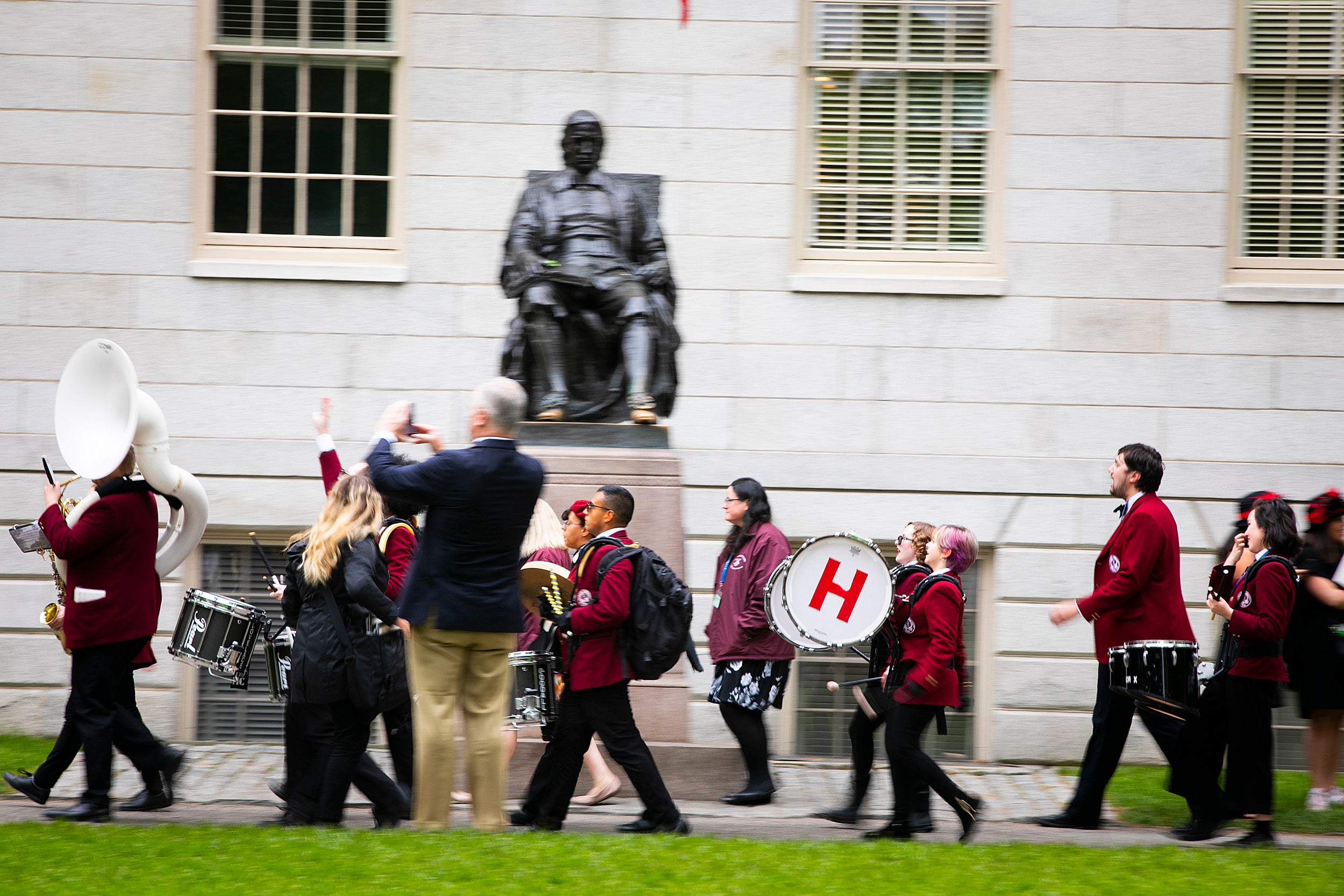
The Harvard University Band marches by, under the watchful eye of the John Harvard Statue.
Stephanie Mitchell/Harvard Staff Photographer
Today the Harvard University Band looks much different than it did almost 50 years ago. Heading through the Yard on a brief break from their Commencement duties on Thursday afternoon were three members of the band’s wind section: flutists K. Stawasz ’22 and Jessica Bishai ’20, and piccolo player Anabelle Paulino ’21. The trio played that morning as the academic procession entered Tercentenary Theatre and were soon heading back to their seats under a small tent to accompany the afternoon ceremony.
Though all three were wearing their Crimson band blazers, only Bishai, the band’s reunion manager, had on a gold tiara and a white sash. The accessories were meant to signify the band’s centennial, said Bishai, which will be celebrated in October with three days of festivities.
As for their favorite piece, the three agreed a Harvard fight song called “Up the Street” topped their list. It includes a flute solo and a chance for them to briefly put down their instruments and kick up their heels. “When that song is playing we will just run around and do-si-do, and do a cancan, and then we play our feature,” said Paulino.
“And today was really neat because we got to include all our seniors who came over after the ceremony and we played it for them,” said Stawasz. “So we got to include them in our kick line, which was really fun.”
— Colleen Walsh
Friends through the years
Enjoying his reunion lunch under a tent next to Holden Chapel was Brookline resident Ralph Aserkoff from the Class of 1958. He was what was known back then as a physical sciences concentrator, he said, a track that eventually took him to medical school to become an obstetrician-gynecologist affiliated with Beth Israel Deaconess Medical Center. Recalling his campus days more than a half-century later, Aserkoff said certain changes stand out.
“It was all male, the women were all at Radcliffe,” he said. “We all went to class in coats and ties. We had to wear coats and ties for dinner, and we didn’t have nearly the choices of food they have now, from what I am told. We had classes and exams which went into June. Exams were after Memorial Day, and after Christmas [during the fall term.] They do it much smarter now.”
His favorite Crimson memories involve the time spent on campus with his College friends, many of whom he is still in contact with today.
“I just liked being at Harvard — the camaraderie, the fact that you were here and that 61 years Iater I am still here and I still know people [from my Harvard days] and have kept in touch with them over the years,” he said.
— Colleen Walsh
Oh, Kirkland!
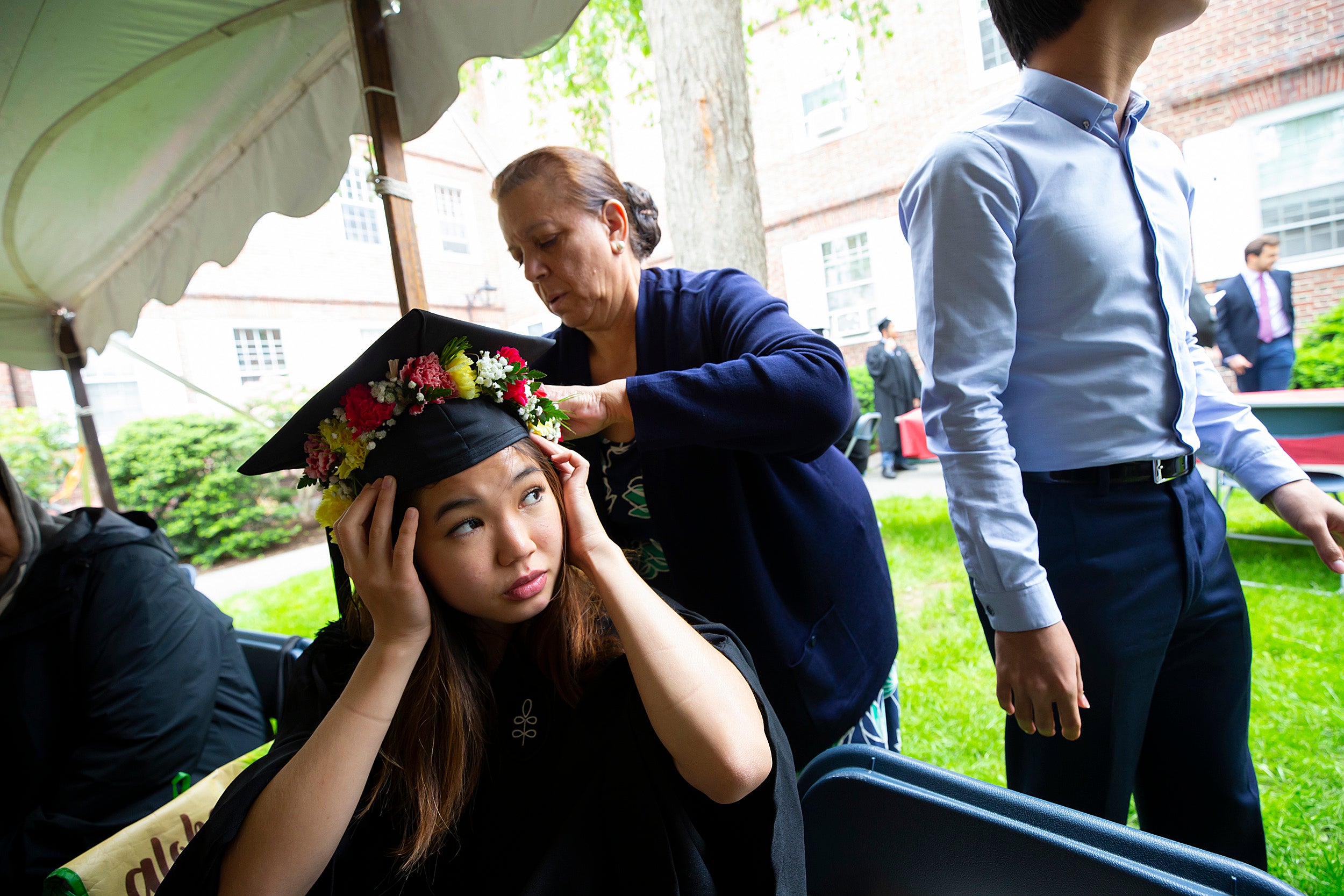
Kirkland House resident Moriah Lee ’19 receives a lei from her godmother, Joleen Cordeiro.
Rose Lincoln/Harvard Staff Photographer
Families, friends, and supporters gathered under the tent at Kirkland House to share in the happiness of graduating students receiving their diplomas.
As he was waiting in line with his classmates before they were called to the podium, Joseph Zuckerman reflected on his residency at Kirkland.
“You come in as a nervous freshman, not knowing anyone, and you find your specific community,” he said. “For me, that’s Kirkland. It’s a great culture of people who buy into the House [that is] set by the faculty deans and House tutors and trickles down from class to class. It’s been a really fun place to live.”
Moriah Lee, the only Hawaiian graduate of the House this year, was accompanied by her family, including her godmother, Joleen Cordeiro. The family assembled leis to present to Lee after her diploma was in hand.
“As part of our culture and tradition we give a lei as an expression of love,” Cordeiro said. “In Hawaii, when families come to greet [graduates], their faces are covered, there are so many leis.”
Cordeiro also made a staff adorned with ti leaves, which represent honor and good luck.
— Lian Parsons
‘Such joyful people’
Adams House residents Eunice Mwabe (from left), Kayla Evans, Cleanna Crabill, and Audrey Maghiro have been friends since freshman year when they were roommates.
Rose Lincoln/Harvard Staff Photographer
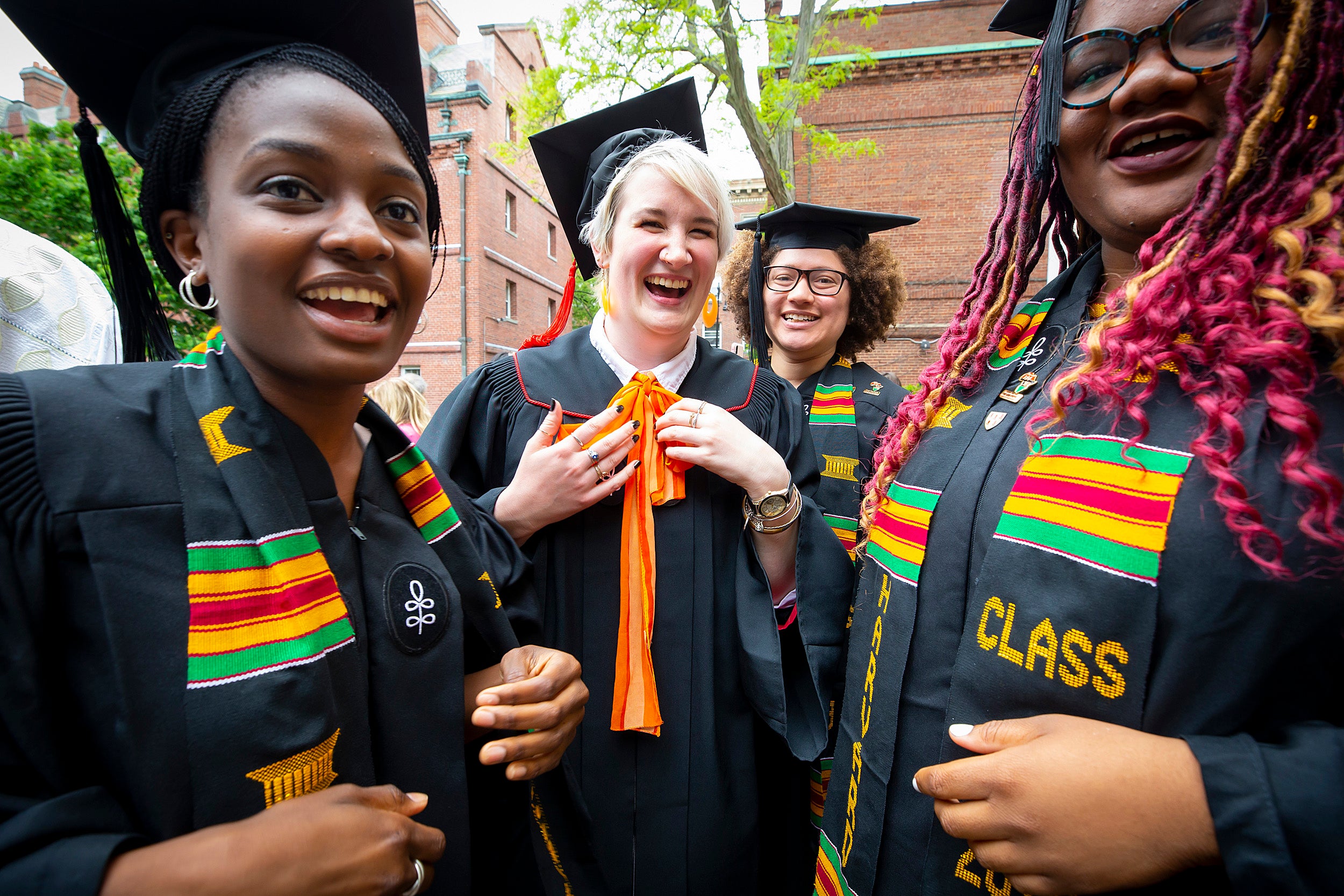
Adams House hosted its diploma ceremony in the courtyard under a cover of clouds. Faculty Dean Sean Palfrey, celebrating his 20th Commencement, called it “perfect weather.”
“[Commencement] is always different,” he said. “There are 150 stories, 150 relationships. [The students] are our best friends by the time they graduate. We hate to see them go, but we’re excited for them and always welcome them back. We don’t see this as truly a goodbye.”
Kayla Evans ’19 said Palfrey and his wife, Judy, “really set the tone for loving each other.”
“They’re such joyful people,” she added. “The way they open their home is the way that students open their hearts to each other.”
— Lian Parsons
A long embrace
On the lawn by Sever Gate, Emily Delman, A.M. ’19, smiled as she stood apart from her HGSE cohort as graduates from Harvard Law School processed into the Yard. She was looking for someone in particular: her husband, Edward Delman, J.D. ’19.
Once she saw him, she bolted toward him and jumped into his arms. They held each other close and whispered some words, followed by one long kiss.
“It’s incredible,” said Emily about sharing the milestone. “We’ve been married for two years, we’ve been together for 12, and we were high school sweethearts, but we’ve never gone to school together before. It’s really wonderful to be able to share this accomplishment together and to have gone through the entirety of the Harvard experience together.
“Our degrees are totally different but it’s really nice to have this moment together.”
— Juan Siliezar
A magnetic energy
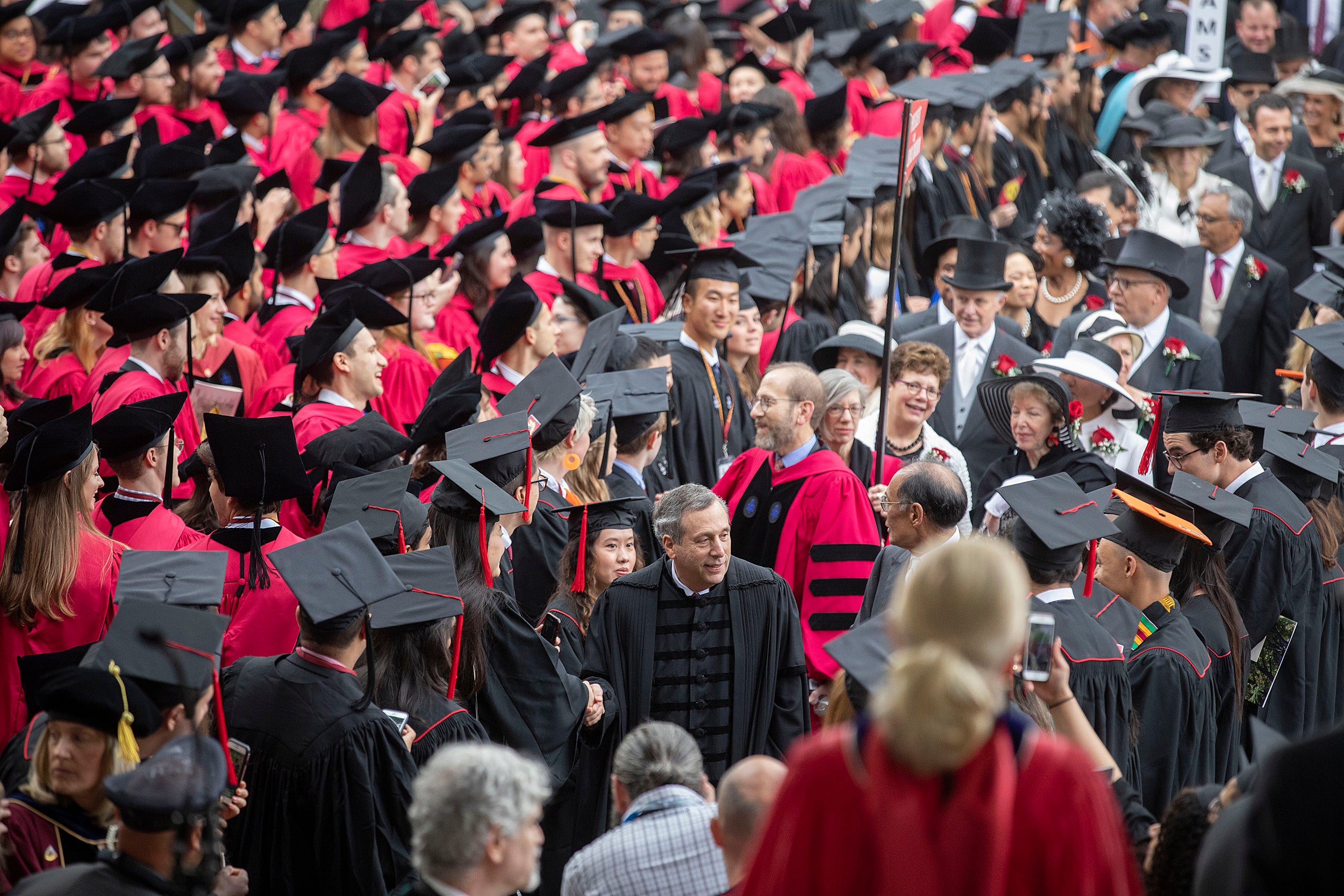
Harvard President Larry Bacow leads the procession to the Morning Exercises.
Kris Snibbe/Harvard Staff Photographer
On Commencement Day, John Parro, a senior marshal, faces a barrage of questions from attendees.
“They’re asking where their kids are going to be processing down, they’re asking where the best places to sit are, where their recommended sections are, restrooms, first aid, what have you,” Parro said.
It’s almost nonstop as more than 30,000 attendees file in, many there for the first time and all wanting to be in the best possible spot to watch their graduate process.
This is the third commencement Parro has worked since his own in 2014, when he earned his master’s of liberal arts in finance from Harvard Extension School. He just can’t stay away.
“I just love it,” Parro said. “The energy in the Yard is just magnetic. It brings me back every year. Everyone’s happy to be here. Everyone’s excited. It’s just truly a memorable event.”
— Juan Siliezar
Be prepared for change
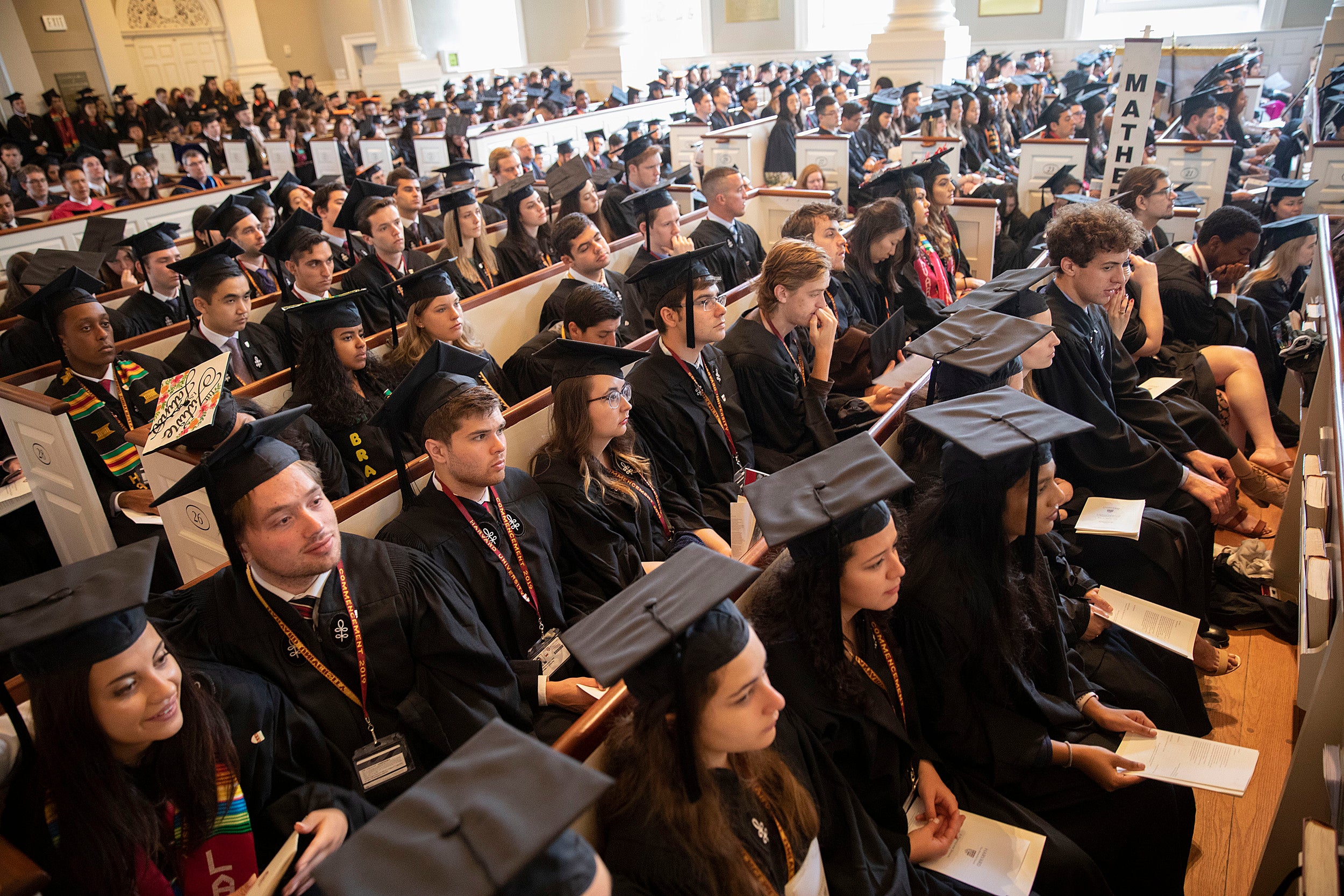
Students attend Senior Chapel service with the Rev. Jonathan Walton in Memorial Church.
Kris Snibbe/Harvard Staff Photographer
It was the last chance for the Rev. Jonathan Walton to partake in what he called one of the many “important rituals that we engage in on this sacred day” and he didn’t waste it, snapping a number of selfies from the dais with members of the Class of 2019 to open the traditional seniors service in the Memorial Church.
Walton, the Plummer Professor of Christian Morals and Pusey Minister in the Memorial Church, leaves Harvard this summer for a new role as dean of the Wake Forest School of Divinity. In his final senior address he told the class that “The one constant in life is change,” and warned them to be ready for the changes they will encounter once they pass beyond Harvard’s gates. To help them prepare, he offered the soon-to-be graduates two key “moral guideposts.”
“Do not confuse responsibility with resignation. Some will try to convince you that to become a responsible adult is to renounce the hopes, dreams, and ideals that have propelled you forward thus far. … Being a responsible adult, Class of 2019, does not mean that you should renounce your moral imaginations, your hopes, your dreams, and your creativity,” said Walton. “Hold on. Continue to dream.”
He also urged his listeners not to conflate “intellectual maturity with upward social mobility.”
Willingness to challenge and critique the status quo and to ask difficult questions are key signs of the mature mind, said Walton. And though it may lead to personal and financial losses, such willingness, he added, “may be the only way for you to preserve your moral compass and to maintain your moral courage.”
Walton praised his listeners for their willingness to press for change during their College years and urged them to continue. “With your vision of a more just, loving, and compassionate Harvard, you have left this campus a better place than you found it. This was your gift to us, Class of 2019. Now go out and keep up the fight. Make it your gift to the world — because change, my friends, is inevitable, but growth and maturity [are] optional. You choose, this day, whom you will serve.”
— Colleen Walsh
Harvard’s air-traffic controller
For the first time, Kay Shelemay was the Commencement Day caller, the faculty member tasked with herding the procession of students, faculty, administrators, and honorary degree recipients from the Old Yard into Tercentenary Theatre in a swift, orderly fashion. It’s no easy feat to be the main air-traffic controller for the excited crowd of hundreds dressed in academic robes and square hats, but standing atop the small podium to the right of Massachusetts Hall just before 8 a.m., Shelemay tested her microphone and said she was ready.
The G. Gordon Watts Professor of Music and Professor of African and African American Studies, Shelemay said she was proud to be what she believed was the first woman in the post — long held by Fred Abernathy, Gordon McKay Professor of Mechanical Engineering and Abbott and James Lawrence Professor of Engineering Emeritus — and to be part of an important day.
“Today, it’s really very special because it’s Larry Bacow’s first Commencement [as Harvard president], and we have a great leader of Europe here, so I am excited about that,” said Shelemay.
The thing to which she was most looking forward? “About 9:20 a.m., when it’s all done and I am the last one out and will go back on the stage … it’s very complicated, there are a lot of people working very hard who do very good jobs on this.”
— Colleen Walsh
Clappy hands for health
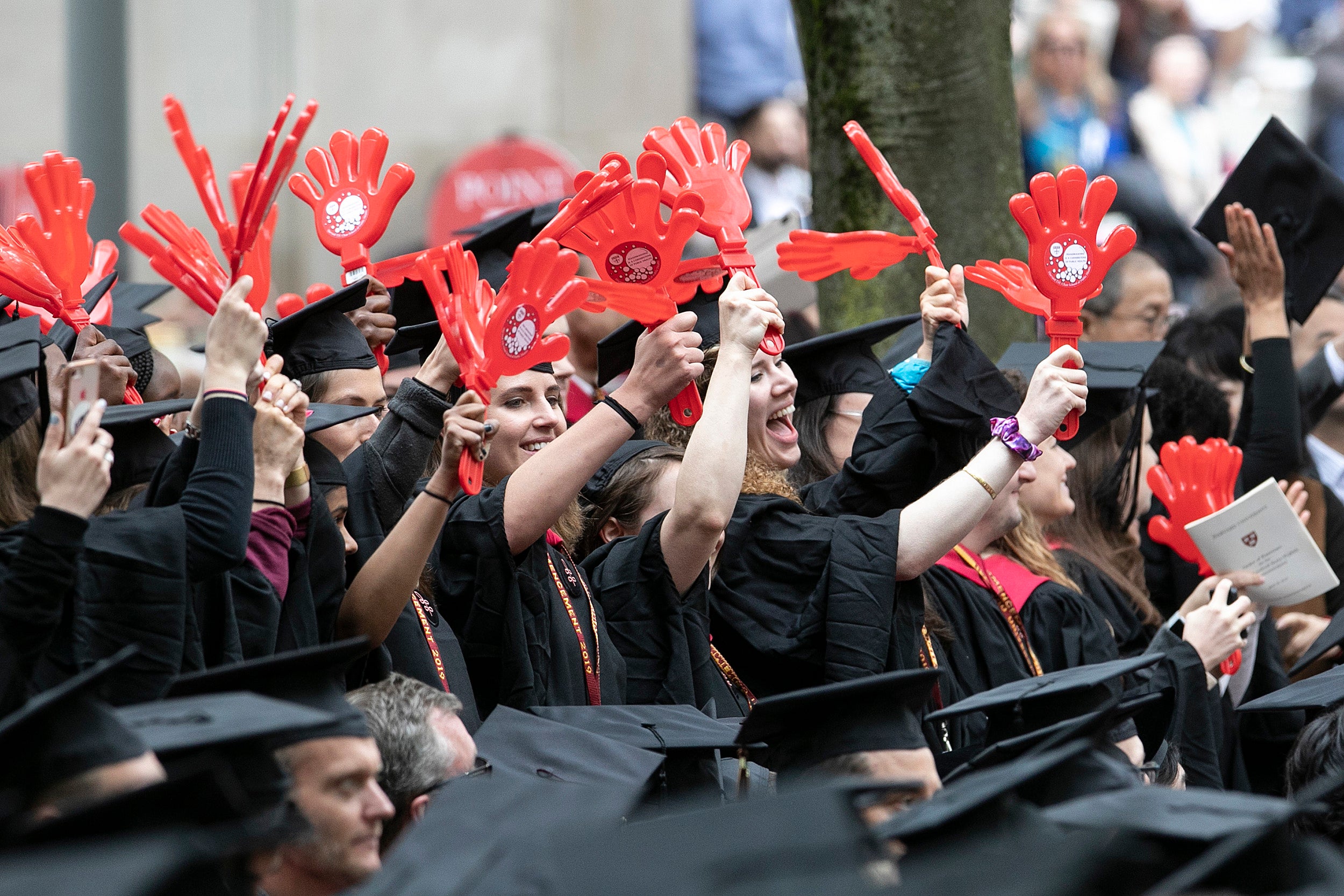
Harvard T.H. Chan School of Public Health graduates wave their approval.
Jon Chase/Harvard Staff Photographer
Before Commencement Day’s procession into Tercentenary Theatre begins, Harvard’s various Schools equip their soon-to-be grads with props — often humorous or ironic — that in some way speak to their broader mission. These are waved during the School’s introduction in the ceremony, in what has also become something of a contest to see which School can cheer loudest.
In years past, Graduate School of Education grads shouted while waving school workbooks, while Harvard Business School’s students hollered and waggled dollar bills. This year’s most comical take on this tradition might go to the Harvard Chan School, whose public health mission was embodied in large plastic hand clappers, which the students waved with enthusiasm as they “solemnly” walked to their seats.
Asked what the clappers were supposed to represent, a passing soon-to-be grad said, “Washing your hands, a cornerstone of public health!”
They also, perhaps coincidentally, make a very satisfying racket.
— Alvin Powell
Parking honors for Drew Faust
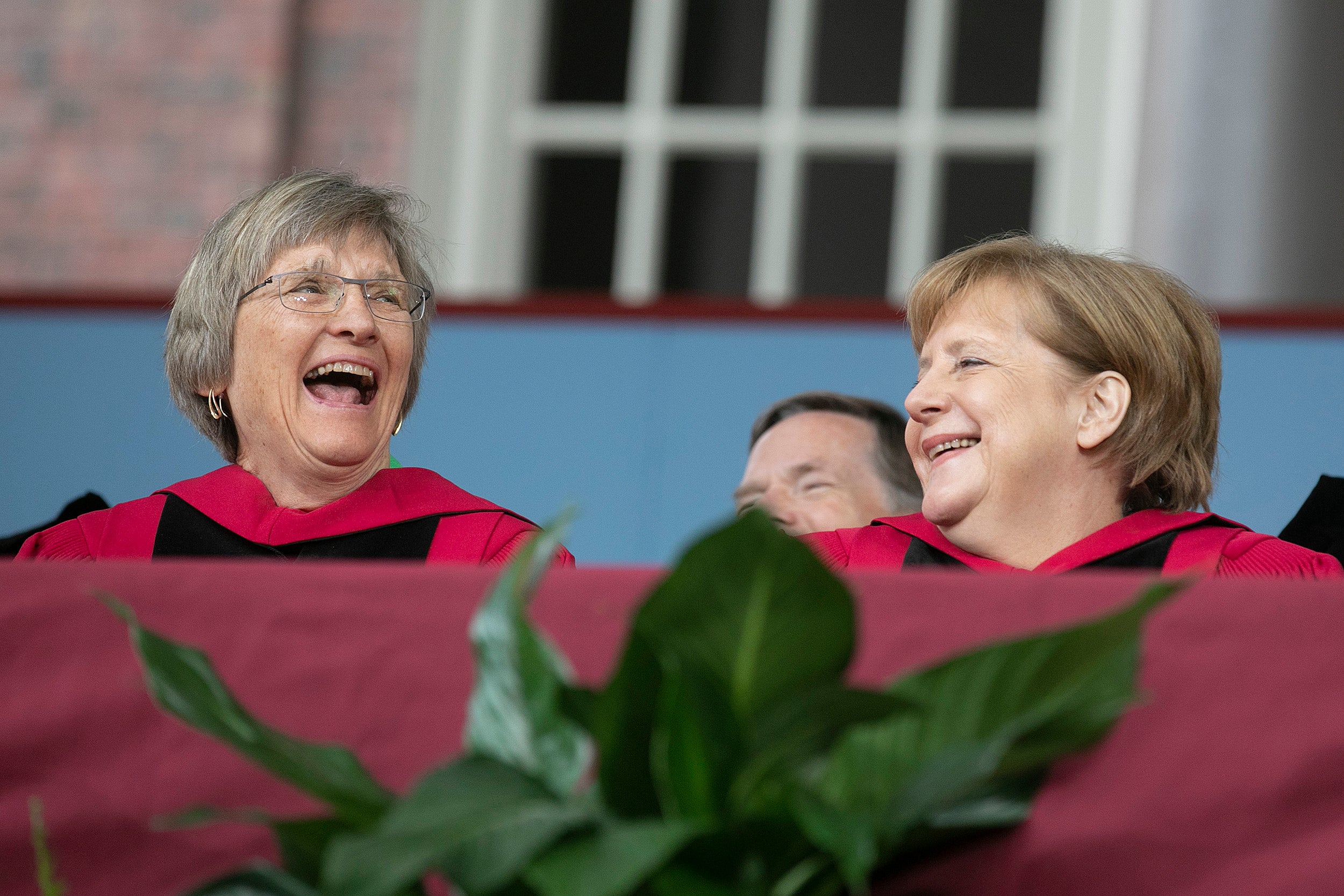
President Emerita Drew Faust (left) laughs at a joke at her own expense, as German Chancellor Angela Merkel joins in.
Jon Chase/Harvard Staff Photographer
Among this year’s honorands was former Harvard President Drew Faust, known for — among many other things — her “Parking Space Theory of Life”: One shouldn’t settle for a spot blocks away, but should first look for a spot where one wants to be.
In introducing Faust for her honorary Doctor of Laws degree, Garber recalled the theory, and noted with affection that Harvard has been its lucky recipient.
“This University and all of us who care for it,” Garber said, “could not be more fortunate that she chose to park her car in Harvard Yard.”
— Alvin Powell
An Ivy ribbing, honorary style
As Provost Alan Garber introduced this year’s nine candidates for honorary degrees, he carried on the playful tradition of needling Harvard’s collegiate rivals, including the Massachusetts Institute of Technology and fellow Ivy League member Princeton University.
In introducing University of California, Berkeley economist Emmanuel Saez, who received an honorary Doctor of Laws, Garber prodded MIT, noting that Saez did his doctoral work at “at a modest technical institute 2 miles east of Harvard Square.”
A few moments later, it was Princeton’s turn. As he listed the many accomplishments of distinguished medieval historian William Chester Jordan, Garber noted that “he has accomplished all this despite having toiled for nearly half a century at an obscure institution of learning in central New Jersey, possibly best known as the setting for several scenes in ‘Transformers: Revenge of the Fallen.’”
— Alvin Powell
‘Incentive to the little ones’
The mass procession to the Morning Exercises in the Tercentenary Theatre.
Kris Snibbe/Harvard Staff Photographer
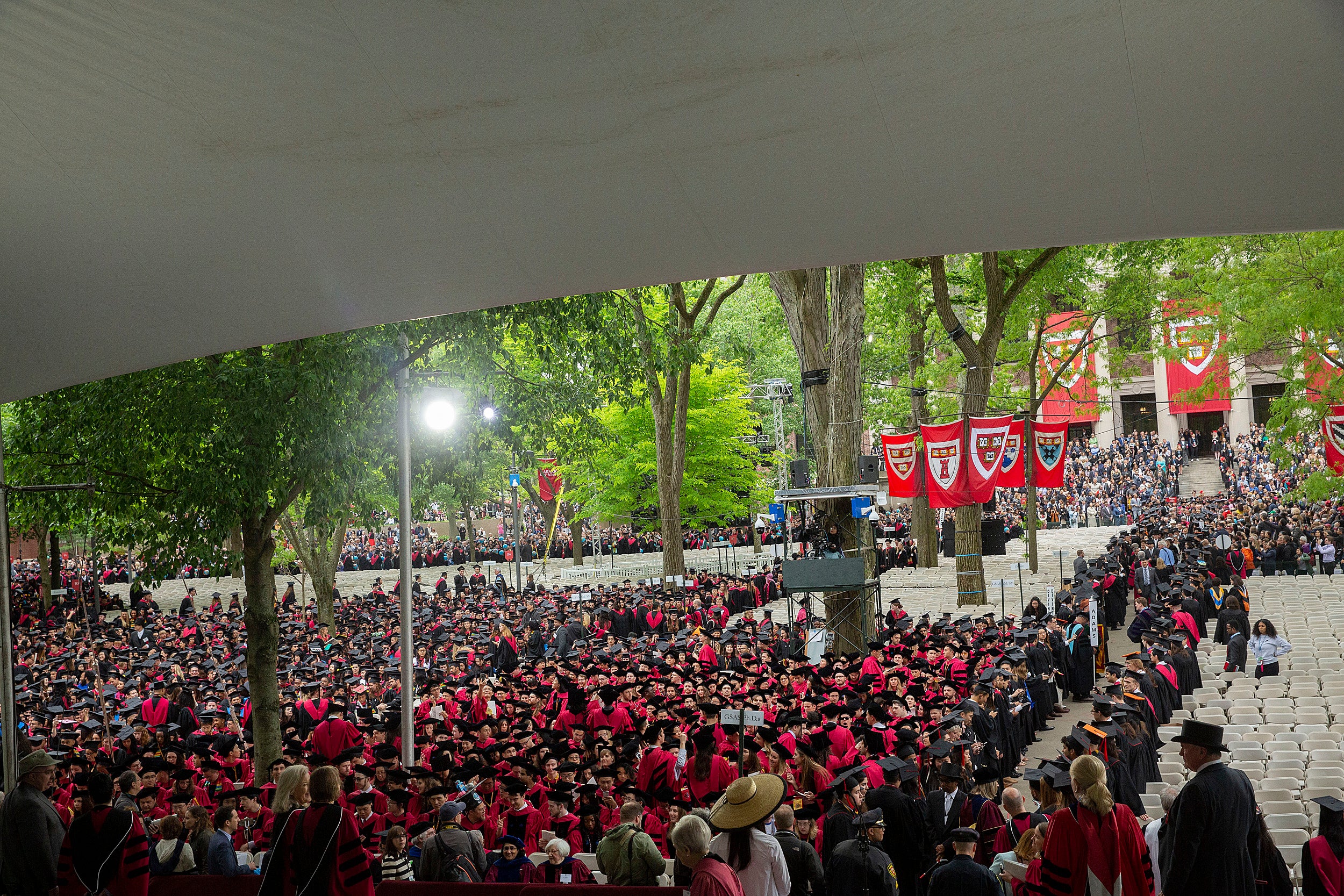
For the family of Gloria Prado, a medical doctor from Colombia’s Choco Forest who graduated from the Harvard Medical School Department of Global Health and Social Medicine, today belonged in a fantasy world.
“It feels like a dream,” said Nayive Pino, Prado’s mother, as she sat in Harvard Yard surrounded by her husband, her two other children, Bonnie and Oscar, and grandchildren Rossana and Edgard. “Coming from the jungle of Colombia to Harvard feels unreal.”
Prado received a master’s degree of Medical Science in Global Health Delivery (M.MSc.-G.H.D.). While she completed her studies, her parents took care of her children, Rossana, 10, and Edgard, 3, in Colombia. The family traveled nearly 3,000 miles to join in the celebration. It was their first time in Cambridge.
Rossana, who hopes to follow in her mother’s footsteps, spoke of the graduation with a maturity beyond her years.
“It’s a reward for all the work and sacrifice she and the whole family made,” said Rossana. “It’s marvelous and an incentive to the little ones to think about graduating from the best university in the world.”
— Liz Mineo
The importance of service
“Service has been a really big part of my time at Harvard and I wouldn’t have it any other way,” said Caroline Zheng, a government concentrator and Winthrop House resident who spent much of her time as an undergraduate involved with the student-run nonprofit Phillips Brooks House Association (PBHA), where she helped organize the first senior day of service during Senior Week.
“Since my freshman year there has been a freshman day of service but there has never been a senior day of service,” she said, “so we thought that it would be cool having seniors think about service and do service for one last time at Harvard. … We made it happen.”
As part of the day the students packed literacy kits and made blankets; some also headed to the student-run Harvard Square Homeless Shelter to volunteer.
Through her work with PBHA, where she served as treasurer, Zheng volunteered at a Mission Hill after-school program tutoring students and as a citizenship tutor in Chinatown, helping prepare adults for the U.S. citizenship test.
“We are always taught to be citizen leaders, but what service is really about is amplifying voices of other people,” said Zheng.
— Colleen Walsh
Instead of winding down, starting up
For many 2019 graduates, Commencement means not so much taking a break as getting down to business. Several students spoke on Commencement Day about launching startup companies in a variety of areas, including fitness and lifestyle products sales.
Fatimaezzahra Ejjennane, who received an A.L.M. in psychology from the Harvard Extension School and has bachelor’s and master’s degrees in business, is working on not one startup, but three.
After graduation, Ejjennane plans to begin building her month-old company, Leaf and Roses, which sells luxury teas, and her two charities — one that digs wells for developing-world communities without reliable water and a second that delivers food to the hungry in her native Morocco.
“I just keep dreaming and the more you dream, the more you want to do,” said Ejjennane, who did her master’s work at Columbia University while working on her Extension School thesis (her Columbia graduation was last week). “You don’t even realize you’re working. It’s like you’re just playing and having fun.”
— Alvin Powell
Back to the world
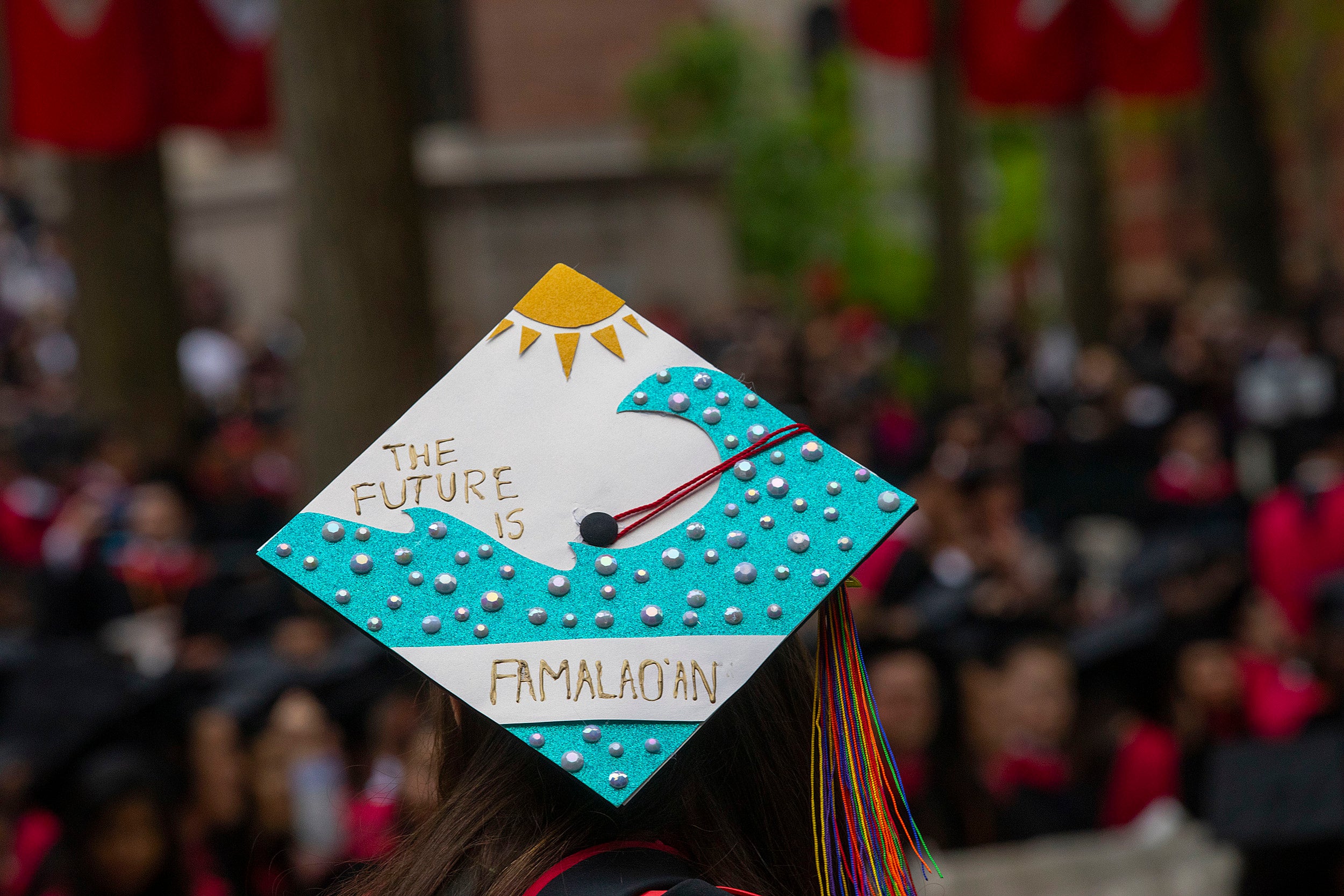
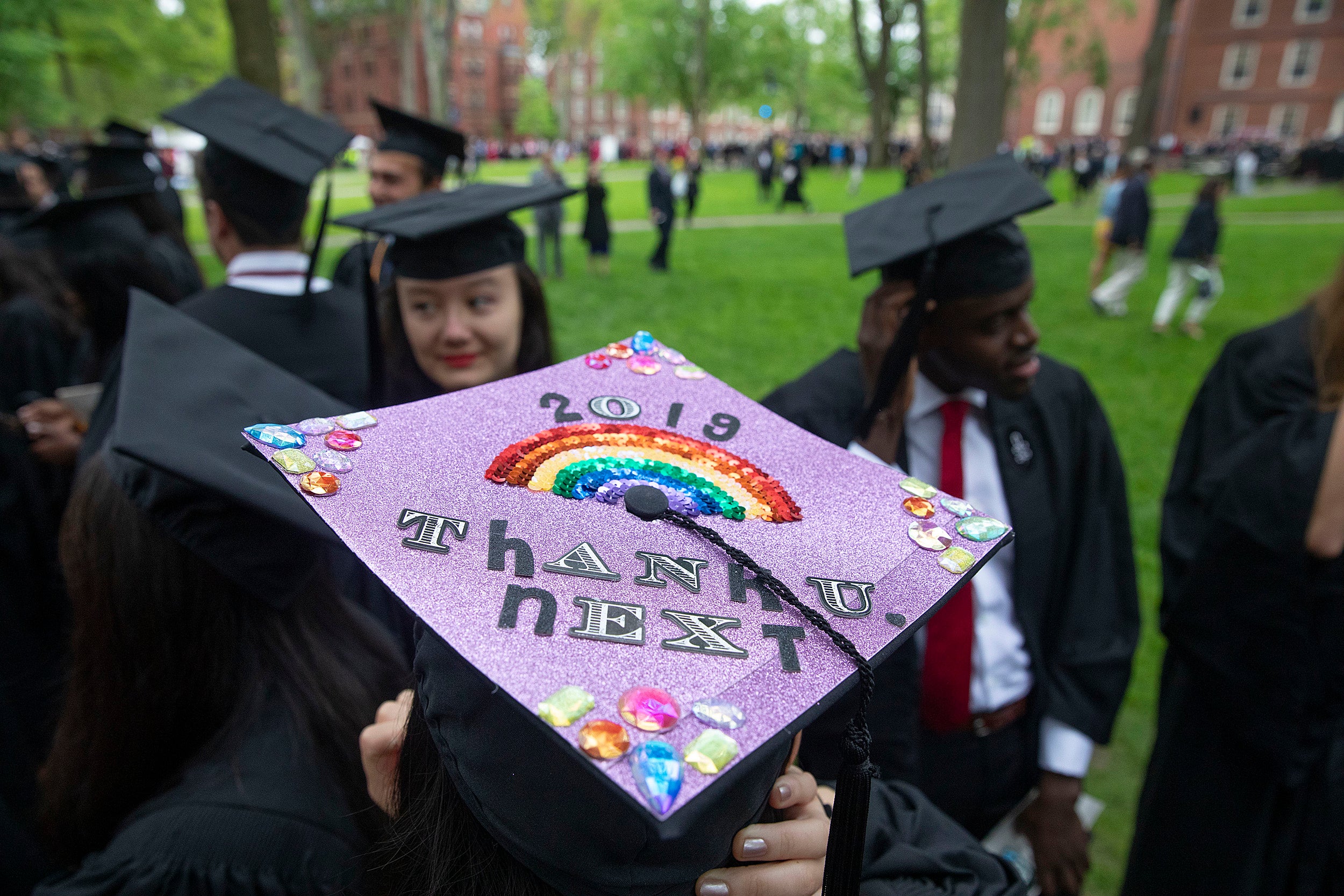
Personalized graduation caps express excitement for the future.
Kris Snibbe/Harvard Staff Photographer
Receiving an M.D. from Harvard Medical School will in some ways bring Cameron Nutt full circle.
Nutt cut his teeth in global health in Rwanda, where he worked with the nonprofit Partners In Health after earning his undergraduate degree from Dartmouth. There, his adviser was former HMS professor and Partners In Health co-founder Jim Kim. Nutt was so moved by his Rwanda experience that he continued his journey by fighting the Ebola pandemic in West Africa. It also convinced him to go to medical school.
On Commencement Day, Nutt said he’s looking forward to doing his residency in internal medicine and infectious disease at Brigham and Women’s Hospital and then returning to work with Partners In Health, possibly in Rwanda and West Africa.
“I loved the work … and hope to return to both settings in the near future,” Nutt said. “I’m feeling really excited to get to work and extraordinarily privileged to learn the skills we have alongside an amazing class.”
— Alvin Powell
A bittersweet moment
For Angela Hernandez, this day of festivity is bittersweet. While her husband, sisters, and children are here to watch her receive her master’s in international education policy from the Harvard Graduate School of Education (HGSE), her parents are not. They are home in Brazil, unable to make the trip.
Still, Hernandez wore a huge, red-lipstick smile, knowing that her parents were with her in spirit and that the messages they imparted helped get her here. “They always supported me and they always reminded me that education was the tool that would help me reach my goals,” she said. “As a first [generation student], that was amazing for them to just tell me, ‘Follow your dreams, work hard, and this is how you’re going to make it there.’”
Now she has a message for them. “Even though you’re very far away, today you’re here with me in my heart, celebrating with me,” Hernandez said. “This is for you.”
She’s looking to take the next step in a program she co-founded while at Harvard — a network of home-based day care centers in Brazil called Movimento Pela Infância.
“The solution empowers women with pedagogical and managerial resources to run their own centers in low-income areas,” Hernandez said. “We ran the pilot during [winter break] and I am excited to focus on taking it to the next phase.”
— Juan Siliezar
No rest for the weary
Getting a Harvard degree is challenging enough. Try doing it while running two businesses, both built around social missions. Such was the path of graduating senior and Dudley House resident Priten Shah, whose venture capital fund invests in minority and underserved entrepreneurs and whose nonprofit helps spread civic education to high schools and middle schools.
Shah, who concentrated in philosophy, said his academic focus helped inform his professional goals. “All of my classes have in some way or another shaped at least the nonprofit work, if not some of the for-profit work as well.
“The entire discipline centered on asking the really important questions in ways that I had never even thought were possible,” Shah added. “I think for all the concentrations for what I wanted to do it ended up being perfect. … It’s a pretty big aspect of a liberal arts education in terms of shaping who we are as citizens of the world and members of society. I think asking the important questions and having the tools to answer them, even if you don’t have the answers already, is going to be super important” moving forward.
Next steps for Shah? “I am going to be back to work tomorrow morning,” he said.
— Colleen Walsh
As much for him as for her
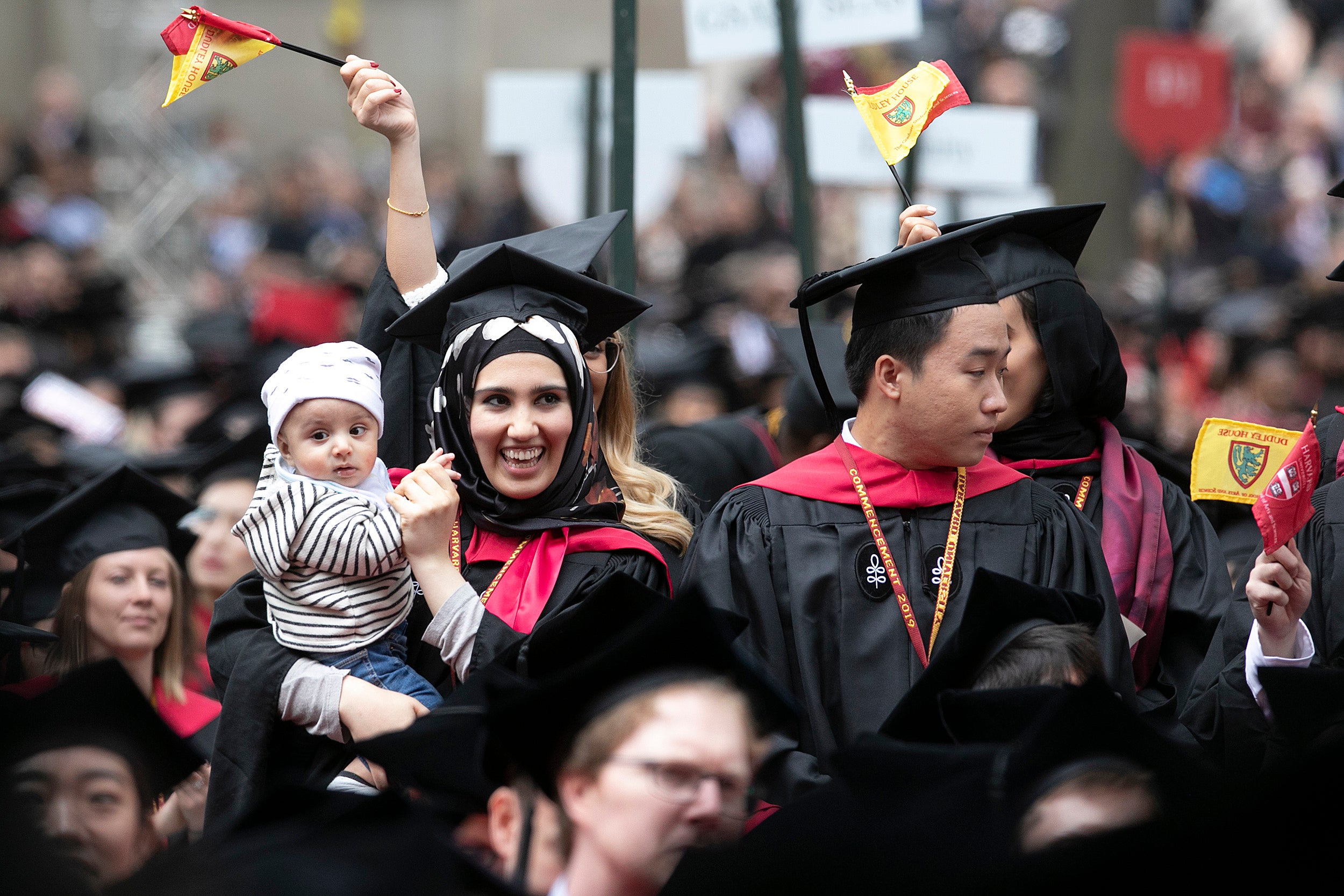
Khadijah Qamar (left) celebrates the conferral of GSAS degrees with her 6-month old, Abdul Latif.
Jon Chase/Harvard Staff Photographer
Khadijah Qamar stood near the steps of Widener Library holding her son, 6-month-old Abdul Latif. Qamar, earning her master’s in Near Eastern languages and civilizations from the Graduate School of Arts and Sciences, was determined to walk across the Commencement stage holding Abdul because, to her, this degree is as much his as it is hers.
“He was born in November, in between the one-year program I have,” said Qamar, who lived in Houston before coming to Harvard. “It was definitely a challenge having a newborn baby throughout this semester, but I feel like today is an accomplishment for [us]. I am really excited for the moment for when I cross the stage and my baby gets a degree!” She laughed, then turned serious again.
“It has really been a journey to get to this day,” she said, recalling the long nights and days of studying and getting her work done while taking care of him. He was with her every step of the way.
— Juan Siliezar
On his toes with Dining Services
While hundreds of people closely followed the Commencement Exercises in Tercentenary Theatre, a few yards away, inside a tent installed in Science Center Plaza, workers were busy readying tables and chairs before lunchtime.
At the Science Center Gate tent, 28 food service workers overseen by Bob Leandro, director for operations and facilities at Harvard Dining Services, made sure everything was ready for 500 alumni who were to gather there for lunch as part of their 50th reunion celebration.
The menu included turkey club sandwiches on sourdough, fresh veggie and hummus wraps, roasted beef on focaccia, and grilled eggplant salad, among other choices. For Leandro, who has been in charge of serving lunch for the 50th reunion for the past eight years, the experience is rewarding.
“They all are very nice and friendly,” said Leandro. “They all appreciate the work we do.”
A longtime Harvard employee, Leandro celebrated his 47th Commencement today. Asked if they differ from year to year, he answered like a New England native.
“The joy is the same every year; the only thing that changes is the weather,” Leandro said. “Sometimes it’s brutally hot, sometimes it’s rainy. We only have a few nice days in New England. At least we have a nice tent.”
— Liz Mineo
A Class Day laugh
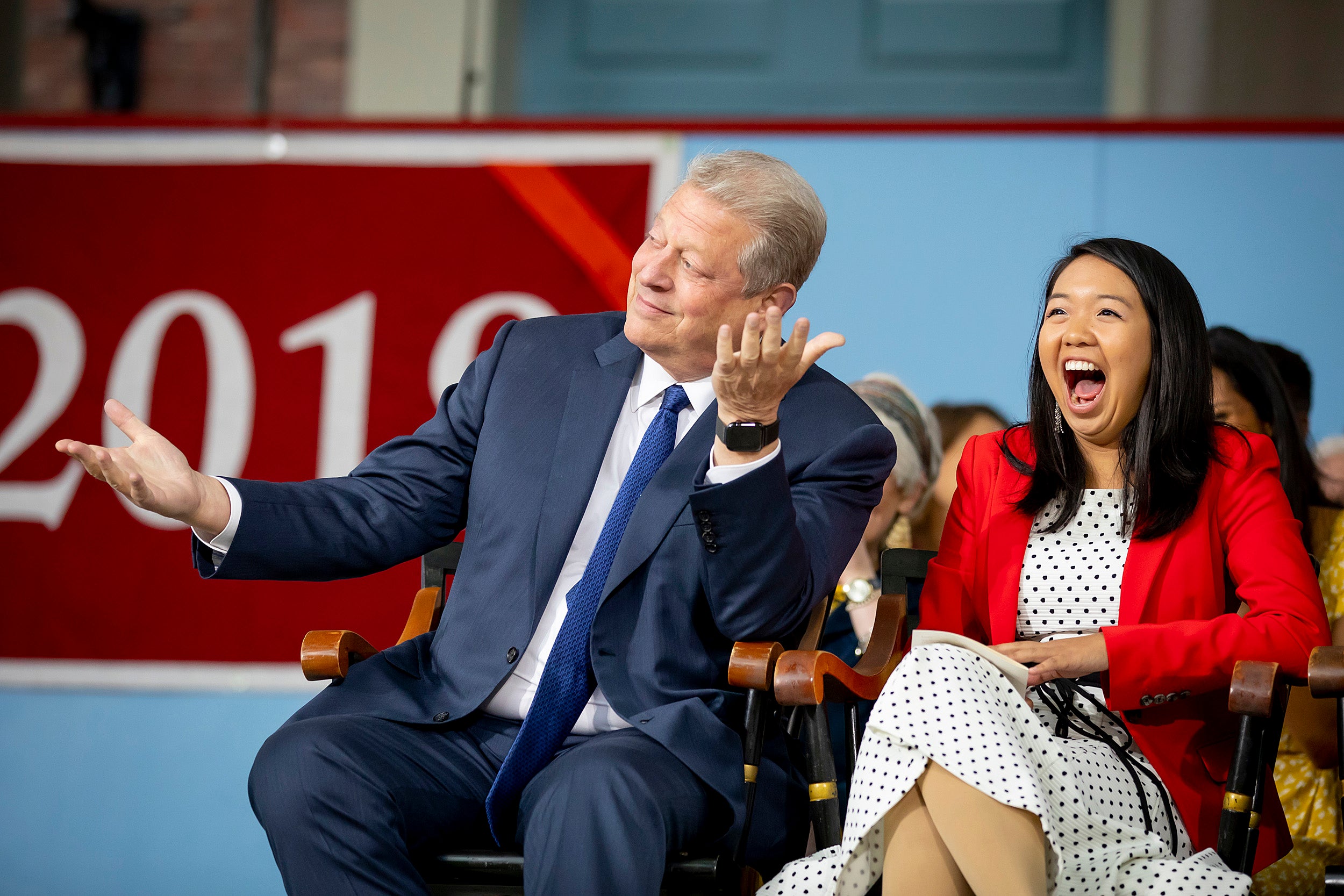
Class Day speaker Al Gore gets a laugh from the crowd — and from First Marshal Catherine L. Zhang ’19.
Rose Lincoln/Harvard Staff Photographer
During his humorous Ivy oration on Harvard College’s Class Day on Wednesday, senior Nicolas Hornedo stood at the podium in front of dignitaries, including speaker Al Gore, who lost the 2000 presidential election by the slimmest of Electoral College margins despite gaining more votes than George W. Bush.
Hornedo riffed on life’s ups and downs, including how, though Harvard defeated Yale twice during the Class of 2019’s four-year tenure, they also lost twice.
“But that’s life. We take the good with the bad, because … for every popular vote, there’s an electoral vote,” Hornedo said to laughter from the crowd, adding. “I’m sorry, mister vice president, the search for veritas isn’t always convenient.”
Minutes later, Gore took the podium and drew his own election analogy, which highlighted his selection to speak that day by the senior class.
“I was paying attention when Nicolas said, ‘There’s always a popular vote and the Electoral College,’ and I actually think of the difference between Class Day and Commencement in those terms,” Gore said. “There was a popular vote to select your speaker here today.”
— Alvin Powell
Old times, from Samuel Eliot Morrison
As Harvard trivia aficionados know, “Three Centuries of Harvard (1636–1936)” is an often ribald recounting of Harvard traditions by Samuel Eliot Morison, Class of 1908, a renowned maritime historian who used to arrive on campus each day on horseback in shiny boots and flashing a riding crop. His now-classic text preserves many essential facts about Old Harvard, as well as some bygone tidbits about Commencements past.
Among them:
Pray give us order
Carousing was once chief among Commencement’s many tried-and-true traditions. The first Commencement was held on Sept. 23, 1642, for nine graduates in the “Old College,” Harvard’s first new building, which stood in an area between Matthews and Weld halls. From very early on, beginning with President Urian Oakes, who served from 1680 to 1681, College administrators were openly concerned about the “excessive hospitality, drunkenness and disorder” at Commencement. Later, Presidents Cotton Mather and John Leverett “adopted severe prohibitions against commencers’ providing plumb cake and mixed drinks in their rooms under penalty of losing their degree.” But with few holidays on the calendar for the public to enjoy, the crowds grew along with the disorder. So, to keep a lid on the rowdiness that Commencement stirred up, during President Benjamin Wadsworth’s tenure (1725–1737) the Corporation would keep the exact date of graduation secret until one or two weeks in advance. It also scheduled the ceremonies not on Wednesdays, but on Fridays “so that the rest of the week would not be consumed with Saturnalia.” But the move was deemed “an intolerable grievance” not just by the public, “but by the country clergy, for whom a Friday Commencement gave insufficient time to sober up and get home for the Sabbath.”
Pay to play
The now-familiar class reunions held during Commencement week began around the 1820s, with those living in the Boston area occasionally gathering for dinners at the homes of fellow graduates. Though graduates left campus, they contributed statements about their lives and plans to an album maintained by the class secretary. The Class of 1822 was the first to publish the album as a report
Even in 1816, paying for a college education was a significant burden. “‘The expense of a college life at Cambridge is very great … near three hundred dollars a year,’ wrote a freshman; to do it in fashionable style must have cost nearer four hundred,” Morison recounted. A Congressman from South Carolina who had arranged for a Boston friend to pay his son’s Harvard bills thought $600 a year a more fitting allowance to live comfortably in Cambridge. Of course, that did not include the cost to host one of the lavish Commencement ‘spreads’ for which “fashionable or socially ambitious parents spared no expense.” One graduate, whose college tuition bill was less than $160 a year, had his parents splash out $780 to provide a catered dinner for 100 guests on a lawn in Cambridge.
Know your robes
Honorands’ gowns prepared for Commencement Exercises.
Stephanie Mitchell/Harvard Staff Photographer
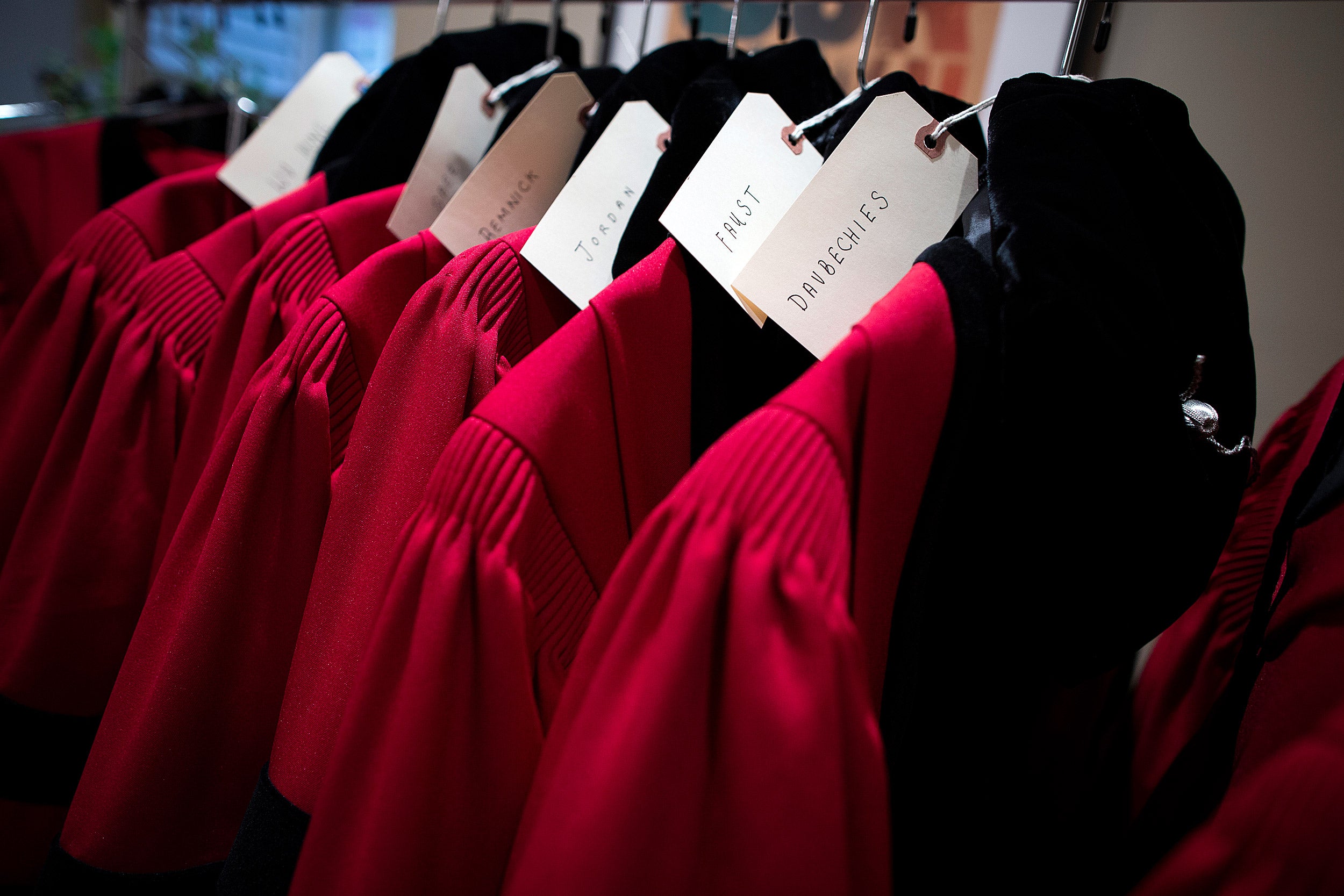
As Oscar Wilde once said, “One can never be overdressed or overeducated.” That’s never more true than today, when Commencement festivities bring out a rainbow of colors against a backdrop of Harvard crimson. According to the Harvard Commencement Office, the colors signify something important about the wearer’s degree and School.
The gowns: Black for Bachelor of Arts, Master of Arts, and professional degrees such as Master of Business Administration; Crimson for Doctor of Philosophy
The hoods: Black with crimson silk linings; longer for doctoral candidates than master candidates.
The lapels: Emblems embroidered on gown lapels, known as “crow’s feet” signify how a degree was conferred. Two feet are for earned degrees, three feet are for honorary degrees. The feet are color coded by the School from which a graduate or faculty member is affiliated.
- White: Faculty of Arts and Sciences, including Harvard College and the Extension School
- Dark blue: Graduate School of Arts and Sciences (Doctor of Philosophy)
- Khaki: Harvard Business School
- Lilac: Harvard School of Dental Medicine
- Brown: Graduate School of Design
- Scarlet: Harvard Divinity School
- Light blue: Graduate School of Education
- Peacock blue: Harvard Kennedy School
- Purple: Harvard Law School
- Green: Harvard Medical School
- Salmon pink: Harvard T.H. Chan School of Public Health
- Orange and gold: Harvard School of Engineering and Applied Sciences
Honorable mention
The very first honorary degree awarded by the University was a Master of Arts given out in 1753. The recipient was none other than Benjamin Franklin, despite the fact that in 1722, as a cheeky 16-year-old writing under a pseudonym in the New England Courant, his family’s newspaper, Franklin mocked the parents of Harvard graduates as “blind to their children’s dullness” and called the University’s students “proud and self-conceited” “blockheads” who left having learned little more than “how to enter a room genteelly.”
It would be nearly two decades before the second honorary degree was conferred. In April 1776, General George Washington was awarded a Doctor of Laws for his leadership driving the British out of Boston just a month earlier. Washington had arrived in Cambridge on July 2, 1775, to serve as commander-in-chief of the Continental Army and lead the effort to snuff out the Siege of Boston. He spent his first two weeks in Cambridge at the Benjamin Wadsworth House in Harvard Yard, the home of Harvard College President Samuel Langdon, before taking up residence at 105 Brattle St. on “Tory Row,” a grand home that would decades later become known as the Henry Wadsworth Longfellow House.
— Christina Pazzanese
The bells, the bells
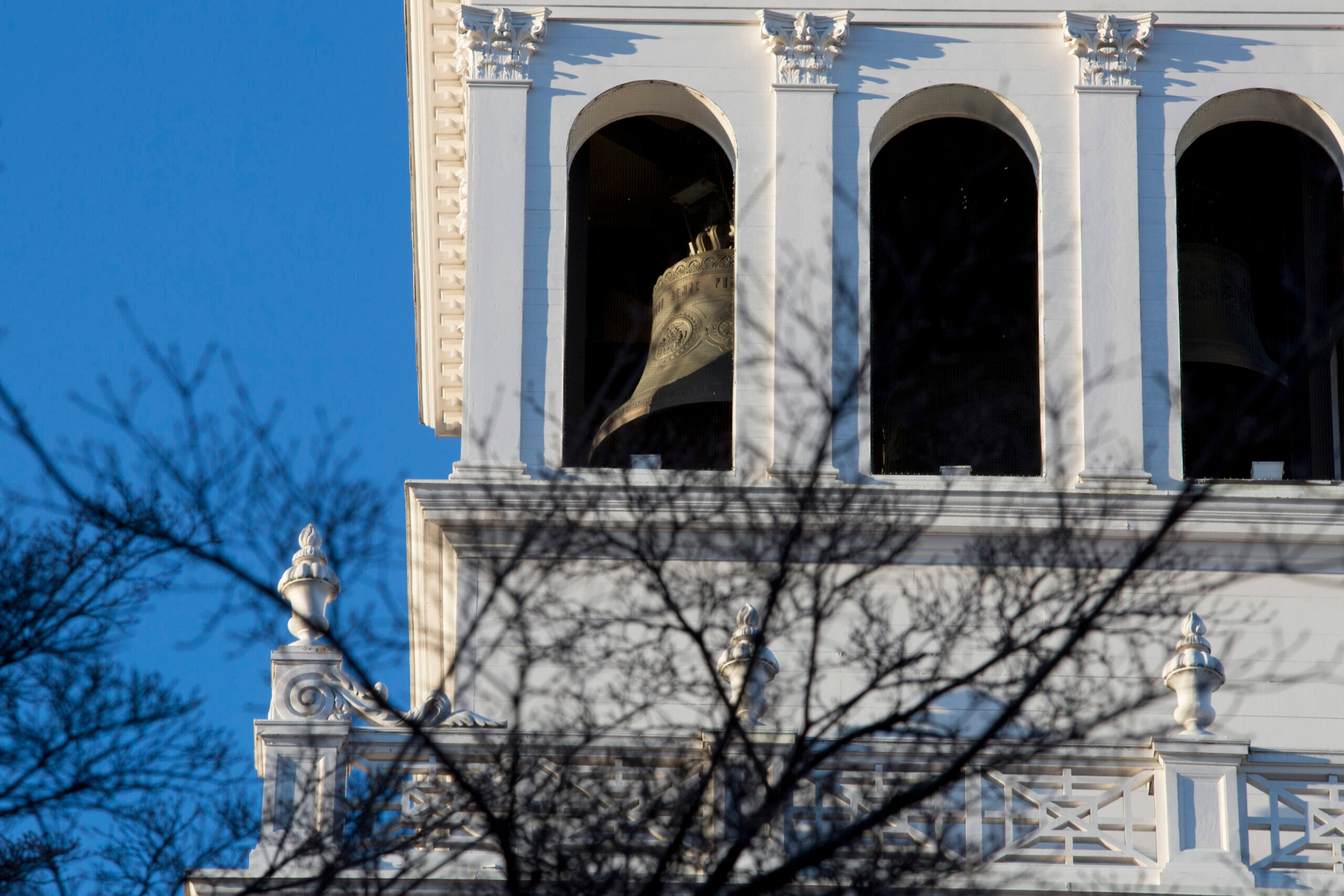
The Lowell House bells on standby, ready for Commencement morning.
Rose Lincoln/Harvard file photo
A peal of bells rang throughout Cambridge on Commencement morning. For the 31st consecutive year a number of neighboring churches and institutions started the ringing in celebration of Harvard and the city of Cambridge.
In a bow to the past, when bells of varying tones summoned people from sleep to prayer, work, or study, this joyful noise began at 11:45 a.m., just after the sheriff of Middlesex County declared the morning Commencement Exercises adjourned. The bells rang for about 15 minutes.
The bell in the Memorial Church tower, for years the only one to acknowledge Commencement Day, was joined in pealing by bells cast to replace the original 17-bell Russian zvon of Lowell House, which was returned to the Danilov Monastery near Moscow in 2008 and by the bells of the Business School and the Divinity School; the historic “Harvard Chime” of Christ Church Cambridge; and the bells of the Church of the New Jerusalem, First Church Congregational, First Parish Unitarian Universalist, First Baptist Church, St. Paul Roman Catholic Church, St. Peter’s Roman Catholic Church, University Lutheran Church, Holy Trinity Armenian Apostolic Church, and St. Anthony’s Church.
— Cynthia W. Rossano
Happiness is hard work
It’s one of the more remarkable logistical feats of Commencement Day: funneling nearly 30,000 people into Harvard Yard, getting them into their seats, and then back out and on their merry way without the unnerving chaos or brusque treatment of concert venues and sports arenas.
That smooth efficiency goes almost unnoticed, thanks to a group of about 80 alumni whose moniker is also their mission, the Committee for the Happy Observance of Commencement.
Each year, the committee strives to maintain the buoyant spirit of Commencement while wrangling the swirl of dignitaries, administrators, faculty, parents, and other loved ones through the convivial confusion, and ensuring the ceremony stays on schedule. The hope is to help facilitate everyone’s celebration without getting in the way.
“You don’t want to dampen someone’s enthusiasm and joy,” said Donna Gibson Stone ’66, who co-chairs the committee this year. “We preach irreverence. Whatever works; whatever keeps the flow going and people happy.”
Committee members are more than ushers. The job requires lots of training, mastery of a thick manual, and plenty of good cheer.
Dressing up in the committee’s formal regalia is a fun but also functional part. Women wear head-to-toe black with red ribbon rosettes and elegant hats of red or black decorated with ribbons and feathers. Men don traditional morning jackets, white buttonless shirts with white ties and gray vests, and, of course, black top hats. Gold nameplates distinguish “Happy Committee” members from class and senior marshals, who dress with similar flair, some wielding batons.
The outfits help distinguish them as event officials and add to the day’s celebratory feel for Commencement attendees and for members, who are in high demand for photos, said Stone, who will perform Afternoon Caller duties, summoning the alumni procession into Tercentenary Theatre for the annual meeting of the Harvard Alumni Association. “People get into it,” she said.
“In some ways, it reflects the stuffy old feeling that the committee once had,” co-chair Ned Notis-McConarty ’73 said of the traditional garb. “But it’s looked at with a sense of humor and has a festive, upbeat [feel]. People see us and smile.”
Barbara Meyer of the Committee for the Happy Observance of Commencement gets ready to roll out the welcome wagon.
Rose Lincoln/Harvard Staff Photographer
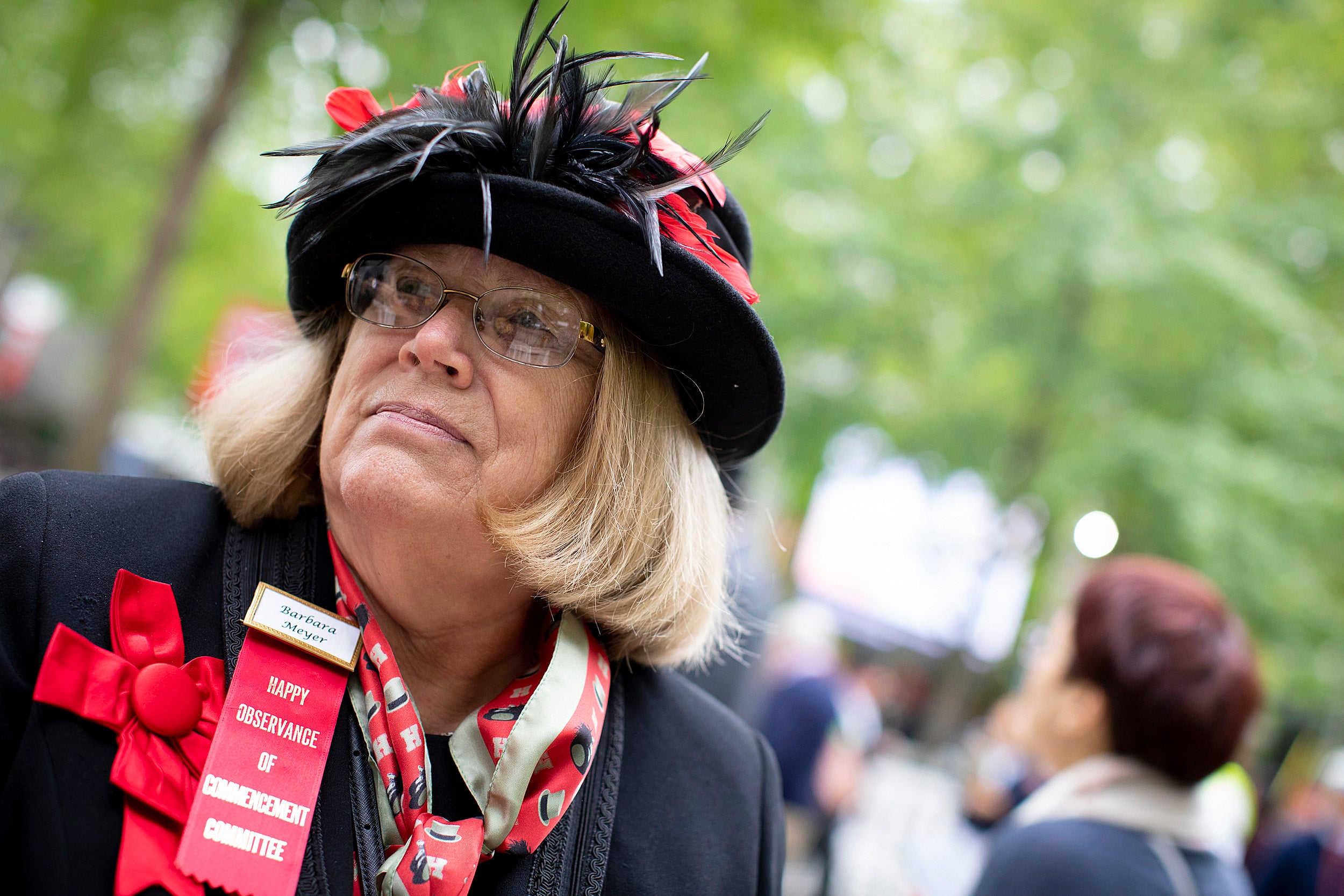
Alumni were first asked to oversee Commencement Day’s Afternoon Program in 1869. Their original charge was to greet and escort the honorands, lead the alumni procession from the Old Yard into Tercentenary Theatre, and arrange the luncheons — the Chief Marshal’s Spread, the Tree Spread, and the Alumni Spread — held after Morning Exercises.
Over the years, the committee became so expert and essential that it is now called upon to help oversee crowd flow during both the Morning and Afternoon Programs and run other large Harvard gatherings, including the annual fall Convocation for first-year students and milestone University anniversaries. It also served during the installations of presidents Larry Bacow and Drew Faust.
Today, members do all sorts of things in addition to the committee’s original duties. They serve as all-day escorts for older alums, assist those who have lost their tickets, call the play-by-play for cable TV coverage, and gently inform parents that no, they cannot scale the fencing to get a close-up photo of their graduating daughter or son, and sorry, sir, you cannot save 12 seats.
A seat on the committee is a coveted perch. Candidates are nominated by members and often selected from the pool of veteran class marshals, senior marshals, and aides. But what had once been an insular, clubby domain has evolved in recent years.
“When I first got involved on the Happy Committee 20 years ago, there were a small number of women and it was very much an older crowd,” said Notis-McConarty. “The Happy Committee reflected the Old Harvard.”
Today, men and women are evenly represented and the group has become much more socially diverse and younger, and includes alumni from a broader array of Schools, including the Extension School.
With Commencement Day falling somewhere between Mardi Gras and the Super Bowl for the Harvard community, achieving “happiness” on it is the result of many months of planning, meetings, and debriefings throughout the year, and some very weary feet at the end of the big day. But it’s all worth it.
“It’s a combination of fun, great friendship, and sense of community with people that are very connected to Harvard over a long period of time, which is very special these days, and doing good work for the University at the same time,” said Notis-McConarty. “For those of us who are doing it, it all fits together that way.”
— Christina Pazzanese




